|
|
||||||||||||||
|
Tag: democracy
Elections 2008. Victory, impunity and terror
Rahnuma Ahmed
I?m a pessimist because of intelligence, but an optimist because of will.?
? Antonio Gramsci, Marxist theorist, politician, founder of the Italian Communist party
Electoral democracy
It was a victory for electoral democracy.
I was the first one to cast my vote. We had gone, en famille. My mother was next. Rini, my sister-in-law and Saif, my brother, had taken their precious national ID cards with them, only to be told by polling centre officials that these were not needed, that they should go to the stalls opened by political parties outside the polling centre grounds to get their voter registration number. That updated and complete voter lists were to be found there. Rini was astounded and kept repeating, even after she had cast her vote, `But it is the national Election Commission that registered me as a voter, I didn?t register with any political party?. Someone else?s photo, name, and father?s name graced the space where Saif?s should have been. After a lot of running around and long hours of waiting, he gave up. It was close to four, the polling booths were closing. He was dismayed, and perturbed.
Shahidul, made wiser by their experiences, ran off to a political party booth to collect his serial number. After quickly casting his vote, he rushed back to take pictures. A handsome young man, showing-off with a thumbs-up sign, caught his eye. He was proud. He had voted for a return to democracy.
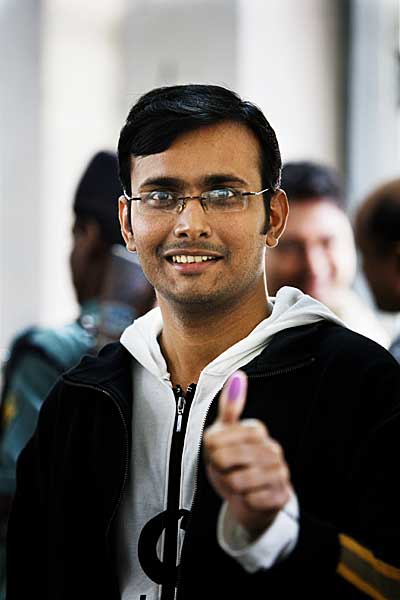
A landslide victory for the Grand Alliance and its major partner, the Awami League. As the results emerged through the night, I remained glued to the TV screen, hopping from one channel to another, listening to election reporting, news analysis, and discussions. As votes in favour of Abul Maal Abdul Muhit tipped the scales, I watched seasoned journalists debate over whether political superstition ? whichever party candidate wins Sylhet-1 forms the government ? would prove to be true. And it did, yet again. The BNP candidate, ex-finance minister Saifur Rahman lost to Abdul Muhit by over 38,000 votes.
In the early hours of the morning, as AL?s massive victory became apparent, I watched Nurul Kabir voice strong words of caution on one of the election update programmes on a private channel: given the rout of the opposition, the biggest challenge for the incoming Awami League government would be to not lose its head. Words to be repeated by others, later. Sheikh Hasina herself, in the first press conference, pronounced it to be a victory for democracy. A victory for the nation. People had voted against misrule and corruption, against terrorism and criminal activities, and against fundamentalism. They had voted for good governance, for peace, and secularism. Poverty, she said, was enemy number one. Expressing her wish to share power with the opposition, Sheikh Hasina urged ex-Prime Minister Khaleda Zia to accept the poll results. Our government, she said, will be a government for all. It will initiate a new political culture, one that shuns the politics of confrontation.
Congratulations poured in, in both the print and electronic media. A new sun had risen over the political horizon. December 29th were the best elections ever, kudos to the Election Commission. Awami League?s charter for change was a charter for the nation. It was a charter that had enabled the nation to dream again. To wake up again. A historic revolution ? a ballot box revolution ? had taken place. Let 2009 herald new political beginnings for Bangladesh. Let darkness be banished, let peace and happiness engulf each home. Let insecurities and turmoil be tales of yester-years. Let us, as a nation, build our own destiny.
There were more cautious, discerning voices too. Promising to lower prices of daily necessities is easy, effect-ing it, is harder. Democracy is much more than voting for MPs, it is popular participation, at all levels of society. In order to change the destiny of the nation, the AL needs to change itself first. Landslide victories can herald landslide disasters.
I turned to analysts who sought to explain the victory. What had brought it about, what did it signal? It was the younger voters, a whole new generation of voters. It was women voters. It was the Jamaat-isation of the BNP, and that the anti-India vote bank, the Muslim vote bank, were now proven to be myths. Khaleda Zia?s pre-election apology had not been enough, people had not forgiven the four-party alliance government?s misrule, and its excesses. The BNP party organisation at the grassroots level had failed to perform their duties with diligence, during the election campaign, and also later, when votes were being counted. The spirit of 1971 had returned, thanks to the Sector Commanders Forum, and to writers, cultural activists, intellectuals, media. People had cast their votes for a separation between state and religion, for the trial of war criminals, for re-building a non-communal Bangladesh. I watched Tazreena Sajjad on television argue that we should not go into a reactive mode, that we should not pre-judge that the AL, since it had gained victory, would now forget the war crimes trial issue. It was important, she said, that war crimes trials be adopted as a policy approach, that the government review the available expertise, the institutional infrastructure, and witnesses needed etc. It was important, added Shameem Reza, another panelist on the programme, that the social pressure for holding the trials should continue unabated.
At a record 87 per cent, the voter turnout was the biggest ever. International poll monitoring groups, including Washingtonbased National Democratic Institute, Commonwealth Observer Group, Asian Network for Free Elections, an EU delegation and a host of foreign observers, unanimously termed the polls free and fair, the election results as being credible. There was no evidence of ?unprecedented rigging,? or of the polls having been conducted according to a ?blueprint?. But, of course, observers maintained, ex-Prime Minister Khaleda Zia?s allegations should be carefully investigated. At a press conference, the leader of the 33 member NDI delegation, Howard B Schaffer, also an ex-US ambassador to Bangladesh, said that these elections provide Bangladesh an opportunity to nourish and consolidate democracy. As I read reports of the press conference, I think, neither the US administration, nor its ruling classes are known for nourishing and consolidating democracy. The NDI delegation had also included a former USAID official, an organisation that is known for promoting US corporate interests, rather than democracy. Most of USAID?s activities are, as many are probably aware, concentrated in Middle Eastern countries. Many Arabs regard US foreign aid as ?bribe money?, offered to governments willing to overlook Israel?s policies of occupation. Larry Garber had served as Director of USAID?s West Bank and Gaza Mission from 1999-2004, a period that was partially preceded by four years (1996-200) of USAID withholding $17 million in assistance for a programme to modernise and reform the Palestinian judiciary. The Israelis did not want an independent judiciary. They were afraid it would lead to a sovereign Palestinian state. USAID obliged. And of course, there are other, much worse, US administration stories of felling rather than nurturing democracy. After Hamas won a majority of seats in the Palestinian legislature in January 2006, the Bush administration had embarked on a secret project for the armed overthrow of the Islamist government.
Will the victory for electoral democracy in Bangladesh be a victory for long-term, deep-seated democratic processes? This, of course, remains to be seen. I myself, have two serious misgivings.
A ?smooth transition?: impunity in the offing?
Reporters had asked Sheikh Hasina as she came out after her meeting with Fakhruddin Ahmed, chief adviser, on December 31: will your government legitimise the caretaker government? The reply, highlighted in nearly all newspapers, was: it will be discussed in the parliament. Parliament will decide. I have initiated discussions with constitutional experts. A committee will be formed to discuss the matter. Sheikh Hasina also added, government is a continuing process. It is the duty of a new government to continue processes that have been initiated by the preceding government, in the interests of a smooth transition. But I had watched news reports on TV, and had noticed the slip between the cup and the lip, between what was said, and what was reported in the print media: the ordinances passed by the government will be discussed, those that are good will be accepted, and those that are not…
How can something as grave, as sinister as the takeover of power by a coterie of people who were backed by the military, a government that was unelected and unaccountable, the suspension of ?inalienable? fundamental rights of the people during a 23 month long period of emergency, the abuse of the judiciary, the intimidation of the media by military intelligence agencies, illegal arrests leading to already bursting-at-the-seams prisons, custodial tortures, crossfire deaths, the destruction of means of livelihood of countless subsistence workers, the closure of mills, the havoc wreaked on the economy ? be referred to as a bunch of ordinances that need to be discussed and separately reviewed, maybe some of these are to be accepted, others not?
Diluting? Diverting? As I said, I have misgivings.
Allying with bigger terrorists
The separation of religion and politics subsumes the issue of the trial of 1971 war criminals, the local collaborators, the rajakars. But as I watch AL parliamentarians talk on TV channels, I notice a linguistic elision, a seepage occur into discussions of the trials of war criminals. The present is carried over into the past, the past slips into the present. Those who had collaborated in the Pakistan army?s genocide take on Bush-ian overtones: rajakars are religious extremists are Islamic militants are ?terrorists.? A seamless whole seems to be in the making.
And, as I read of Sheikh Hasina?s support for the US war on terror (expressed to the US Assistant Secretary of State for South Asia, Richard Boucher, 25th of July 2008), and her more recent pledge to work for the formation of a joint anti-terrorism taskforce by SAARC countries, I wonder whether ?the spirit of 1971? will be cashed-in to manufacture support for the US-led war on terror, one that has killed millions, and made homeless several more. All in the name of democracy.
Be Careful What You Wish For
The words were by Ruhul Amin, a boy the children from the “Out of Focus” group had written a story about, for the Junior Summit Magazine in their New Year issue in 2001. The “Out of Focus” group were no longer children, but young adults, and now my colleagues at Drik. The stories they have told me over the years continue to provide food for thought.
“Desh kothai?” is the most common question a new found Bangladeshi acquaintance will always ask you, unless they have been brought up abroad, or are yuppie urbanites. The question, ‘which land are you from’ is a way of placing you, determining your roots, establishing linkages, forming identity. While many Bangladeshis now live in cities, it is the ‘desh’ that they long for.
Come Eid, or any other of the many holidays we have, the cities become empty, and the rooftops of the outbound buses and launches are packed. Sadly, there are frequent accidents, and many deaths. But still they come to the city. In the hope for a job. In the belief that in the big city, things will change.
So it was that the streets of Dhaka city were quiet on election day. People had gone back to the villages, to their desh, to vote. Rahnuma’s brother Saif, was telling me of how they had to drive in voters in Richmond, in London, and they’d still end up with only 35% voting. Bangladesh’s enthusiasm for elections was exemplary. There was a good turnout all day, and while in every polling centre I visited, many complained about not having been able to vote, it was put down to faulty lists and inefficiency. There wasn’t the suggestion of foul play.
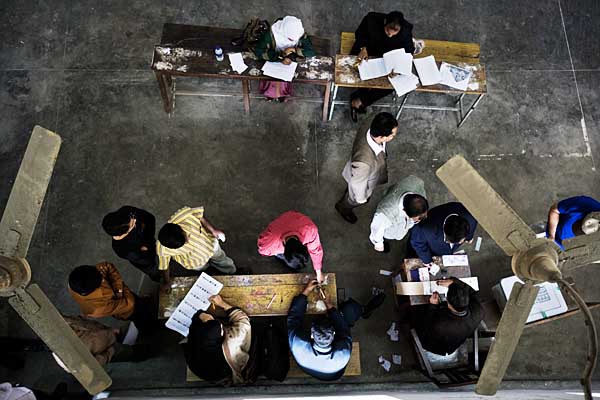
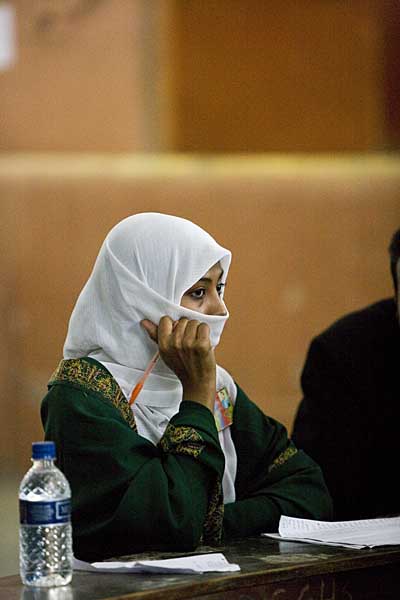
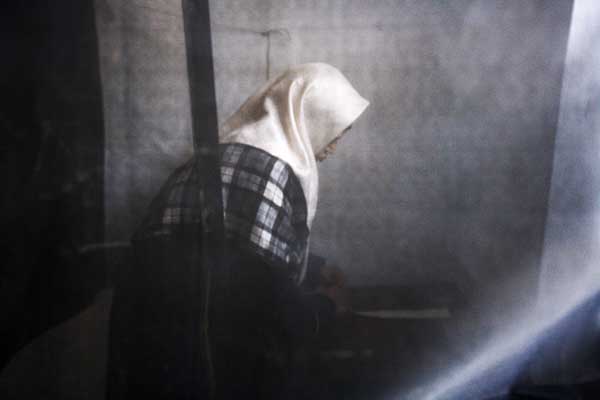
Election updates at Himal Magazine with photos from DrikNEW
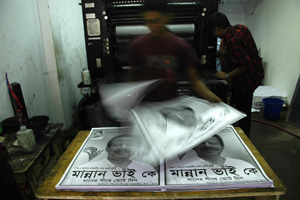
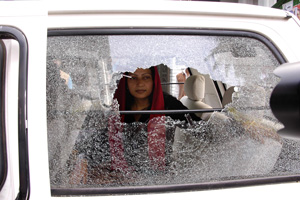
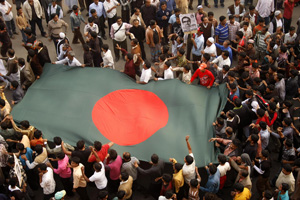
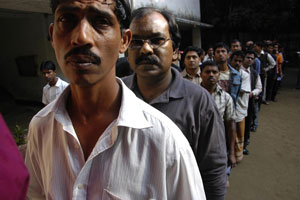
[wpvideo HHTnTaKC]
I met Dadon Mia, the beggar on the pedal chair who staked Satmajsid Road, at one of the polling booths. He didn’t have a fixed address, but his persistence had ensured he was included in the voter’s list. He had voted for the first time. A gentleman I had last seen in Malaysia, when I’d been doing a story on Bangladeshi migrant workers, remembered me. “Do you still cycle? he asked. Yes. “tahole ato mota kan?” (Why are you so fat then?). This Bangladeshi frankness might have been considered rude in other places. But here it was perfectly commonplace. It was with caring concern that he reminded me of my pot belly. The adviser Hossain Zillur Rahman smiled when we briefly met at Dhanmondi Girls School. I had been critical of Zillur in my writing, but on the occasions when we did meet, Zillur had always greeted me with a smile. There was no sign of violence, and apart from the irate, and sometimes tearful voters, who had been denied a vote because the list didn’t have their names, the polling seemed to go remarkably well.
As we stayed up all night, there was initial relief that the visibly corrupt, vote rigging BNP, had not come back to power (it would have given all the wrong signals), and then euphoria upon the knowledge that Jamaat had been routed. But as the enormity of the landslide victory for Awami League sank in, I remembered the? Sir Arthur C Clarke quote that my friend Nalaka Gunawardane often used. “Be careful what you wish for,” Sir Arthur would say, “it can come true.” I had voted for the Awami League. Not because I thought they would form a good government – there was ample evidence to suggest they were incapable of that – but because another five years of BNP misrule would have been intolerable. And since we certainly didn’t want military rule, the Awami League it had to be.
The initial rejection of the results by BNP sounded like the usual sour grapes. Why couldn’t they for once, lose gracefully? But then I started thinking of the excessively high turnout figures. We knew the military needed an Awami League win, but had they overdone it a bit? An Awami League majority was one thing, but could we survive an elected BAKSHAL? As media whispers (not published generally) began to talk of the unreported vendettas being played out across the country, of polling officers having been bought out, doubts began to enter my mind.
My earlier concerns of Jamaat returning to power, or Ershad becoming president again, paled when I considered the horror of an unbridled Awami League let loose on the Bangladeshi public. Sir Arthur had detested astrology, but he was rather good with his predictions. My wish had sadly turned true.
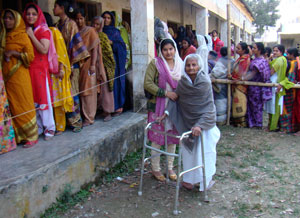
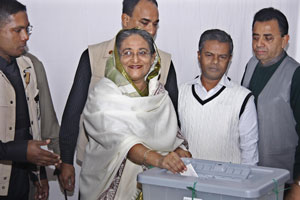
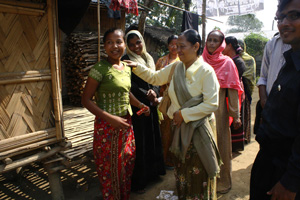
[wpvideo TMwf4413]
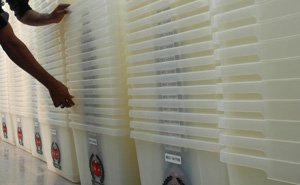
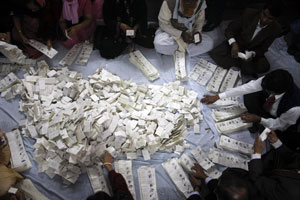
[wpvideo 1OBnctaG]
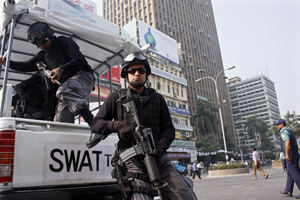
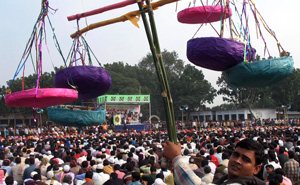
[wpvideo ejjBdh4C]
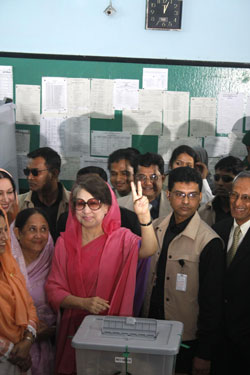
No tax on words
Elections are a big thing in Bangladesh. Going back to his village at peak season was an expensive option for my neighourhood fruit seller, Siddique Ali. The election wasn’t so critical in his case, as his candidate was going to get elected virtually unopposed. But he was going to vote all the same.
[wpvideo HTVifhpy]
My workaholic colleague Delower Hossain had also taken leave, not only to vote but to campaign for his candidate. Our electrician was working late into the night so he could get to Dinajpur in time. He too faced a one-sided election, but wasn’t going to take chances.
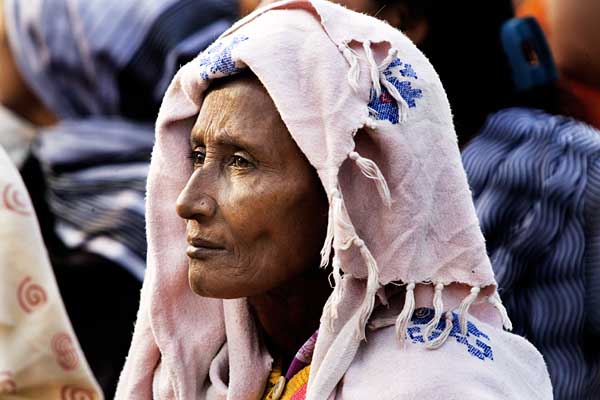
The euphoria in the streets was contagious. It felt good to be milling with the crowds. The smell of the street had its own magic. Contrary to the usual political rallies, These were not filled with hired crowd fillers or party goons, but people who genuinely loved their party and their leader.
[wpvideo FkWsP1kX]
Siddique Ali and Delower, like so many other ordinary Bangladeshis, were hard working, honest and politically astute. When I asked Siddique how well his candidate Shahjahan had done in his previous term, he gave a pragmatic answer. “He was an Awami League MP in a BNP government. You can’t expect him to achieve much.” Still, millions like Siddique and Delower voted. Still, they believed in the power of the people.
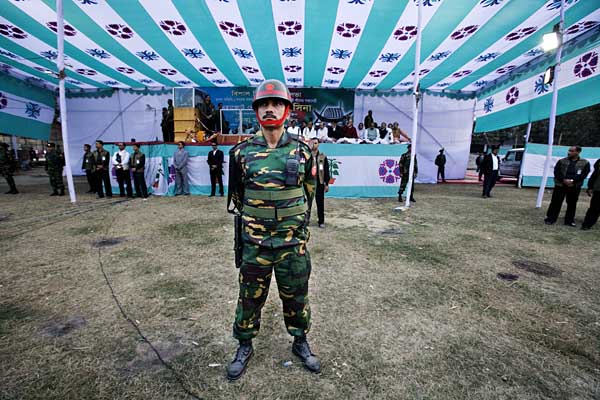
Parking my bicycle near the stadium I followed the crowd into Paltan. There were hundreds of policemen along the way, and everyone was being checked. My camera jacket and my dangling camera allowed me to get through several of the checks, but I did get stopped and politely asked to show the contents of my camera bag. There wasn’t the rudeness that greets one at a western airport, but they were making sure. Times had changed.

I remembered crowding around Hasina and Khaleda during the 1991 campaigns. Ershad had just been removed and there was hope in the air. Whoever won, we would have democracy. At least that was what we felt then
[wpvideo Knabiuhf]
As another military government was stepping down, I knew too well, that this elected government was unlikely to yield democracy outright. The young man with Hasina painted on his chest reminded me of Noor Hossain, the worker killed by Ershad’s police, because he had wanted “Democracy to be Freed”. I remembered that the autocratic general Ershad was back, an ally of the Awami League. And the party made up of war criminals, Jamaat, was on course, an ally of BNP.
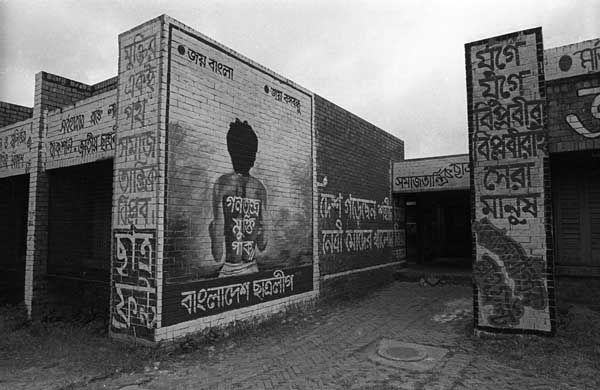
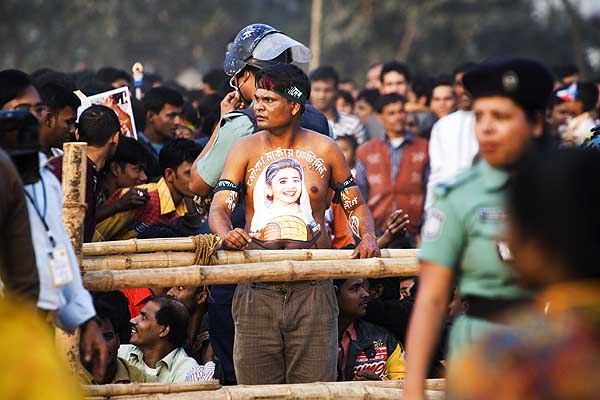
One could have predicted Hasina’s speech. There was not an iota of remorse. Not the slightest admission of wrong-doing. With the arrogance that has become her hallmark, she glorified her previous rule, and villified her opponent. And went on to insult the intelligence of the crowd by promising that every young man and woman would be given a job.
[wpvideo CjS3EEnl]
Through her proposed Internet revolution, no villager would ever again need to go to the city. The complete eradication of poverty was thrown in for good measure. The saying in Bangla ‘kothar upor tax nai’ “there is no tax on words” could not have been more apt.
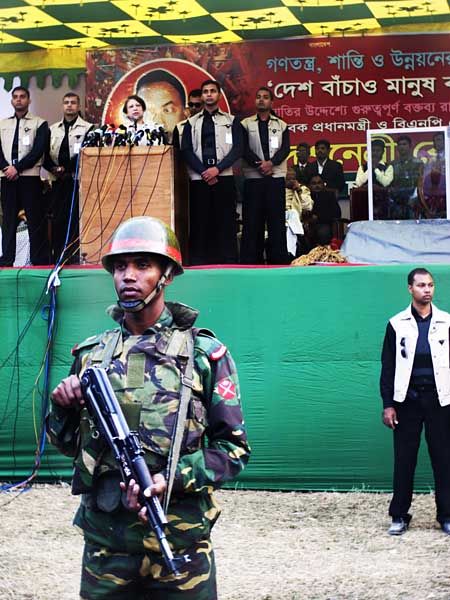
Khaleda, the following day, had done no less. Her promise of leaving no family homeless, was perhaps less extreme than the promise of a job for every youth, but it was still sheer hype. She too promised the magic of the computer, which apparently, could solve all problems. Having overseen the most corrupt five years of Bangladesh’s history.
[wpvideo hNh8k0IY]
Having had her second attempt at a rigged election derailed by a fighting opposition and a defiant public, she spoke of how, if voted into power, she would shape a corruption free Bangladesh! Bypassing the most blatant misdeeds of her sons and their cronies, she spoke of the ill deeds of her opponents. The master vote-stealer even warned of vote stealing. There was perhaps one significant difference between the two. Khaleda did acknowledge that perhaps some mistakes might have been made, and if so, apologised for them. Even such half admissions of blatant misdeeds, is a landmark in Bangladeshi politics.
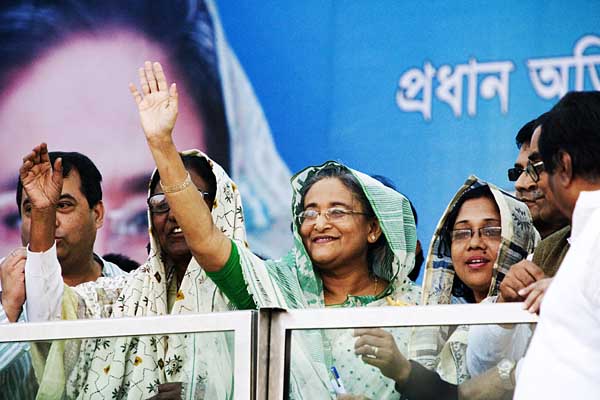
The security was less stringent for Khaleda, and I was able to get to the inner corral without being frisked or having my camera bag checked. Significantly, she chose not to use the bullet proof glass that had protected Hasina the day before. I had been surprised by the lack of women at Hasina’s rally, where I estimated less than a thousand women had gathered.
At Khaleda’s a rough head count yielded figures well below one fifty. Predictably however, there were many white capped men, and the yellow head bands of Jamaat’s militant student wing Shibir. Her’s was a more jubilant crowd, with slogans and chanting going on right through the rally, even during her speech. In comparison, Hasina’s rally had been a more reserved affair. Perhaps an indication of Khaleda’s younger following.
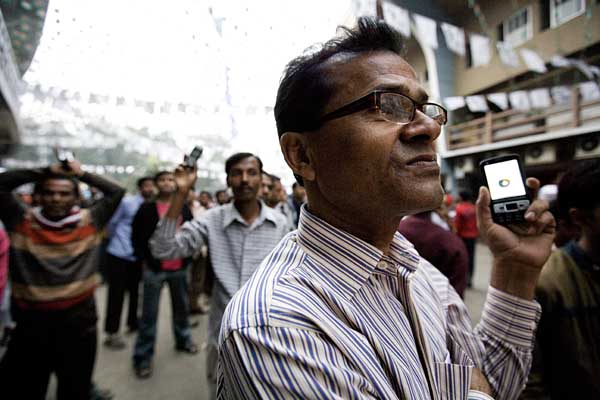
They had plenty of ammunition. Hasina reminded voters of the foreign bank accounts of Khaleda’s sons, and that the BNP had teamed up with war criminals. Khaleda reminded them of the one party rule of BAKSHAL, and the irony of Hasina’s statement that the partners of autocrats were traitors to the nation. Despite Khaleda’s tangential reference to ‘possible mistakes’, neither leader made any direct admission to any of the misdeeds that had ravaged the nation.
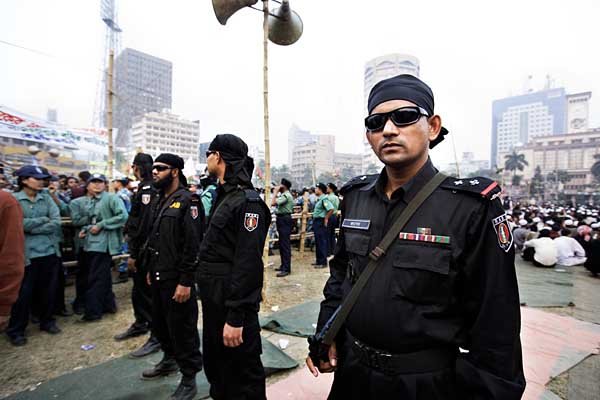
I felt insulted and humiliated. But I could not deny, that both leaders had their followers. Many of the people in the crowd did love them dearly, though there was little evidence to suggest that their leaders deserved, or respected this unrequited love.
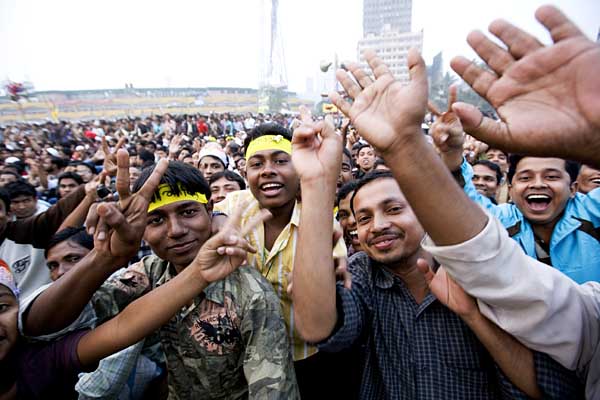
So why this great longing for an elected government? Why this great love for undeserving leaders? An election offers the one hope for a disenfranchised public to be heard. They cling on to these unlikely champions of democracy as their only real hope for a system of governance that may eventually value their will.
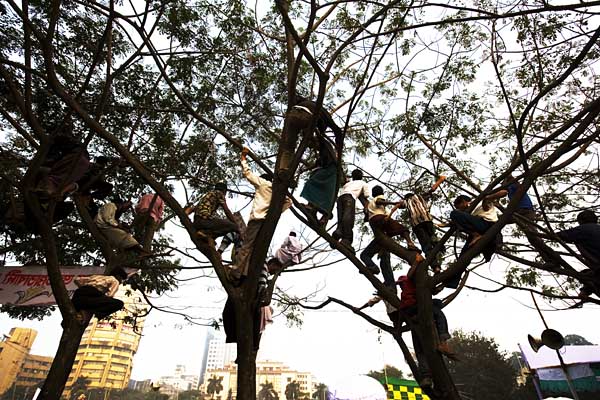
Hopefully the misadventures over the last two years has taught the military that the Bangladeshi public is a tough nut to crack. Even these two arrogant leaders face a more robust media and a more questioning public than they’ve been used to. Delower and Siddique Ali might not get the democracy they deserve, but their love for democracy, will eventually force a change.
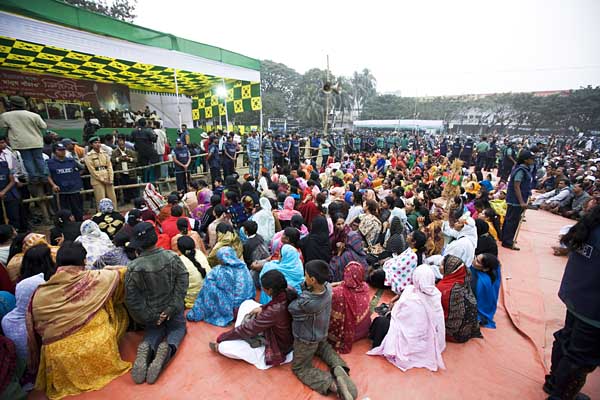
More election pictures at DrikNews.
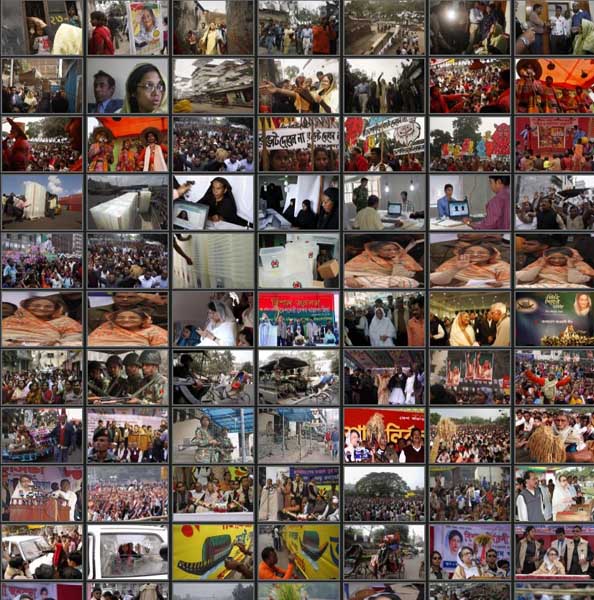
Doubts about December parliamentary elections
Interviews with Nurul Kabir, editor, New Age
Jonotar Chokh (16 October 2008), and weekly Shachitra Shomoy (26 October 2008).
Translations by Rahnuma Ahmed
I have doubts about December’s parliamentary elections: first, whether they will take place — at all — on the 18th. And second, if they do, whether the elections will be such that are acceptable to all sections of society, whether all political parties are able to actively take part in it, and whether the elections, on the whole, are held smoothly ? says Nurul Kabir.
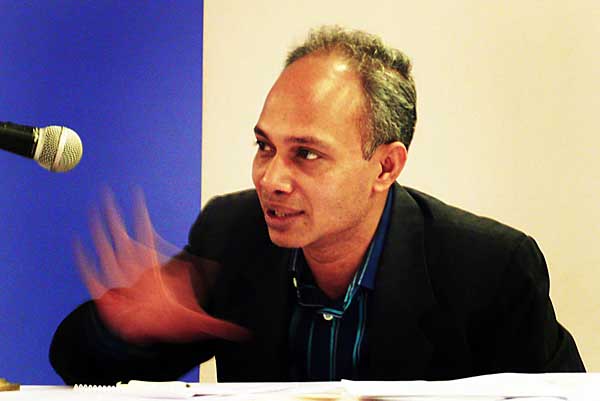
Jonotar Chokh: You often express doubts about whether parliamentary elections will be held on December 18th. Why?
Nurul Kabir I have doubts about December’s parliamentary elections: first, whether they will take place — at all — on the 18th. And second, if they do, whether the elections will be such that are acceptable to all sections of society, whether all political parties are able to actively take part in it, and whether the elections, on the whole, are held smoothly.
When national elections are held under a non-party based caretaker government, the main task is to create an equitable political atmosphere where parties can contest equally, and of course there are pre-conditions to this: conducting constructive discussions with all political parties, big or small, framing democratic norms and rules that are acceptable to all. But the present government and its nominated Election Commission has never been seen to have engaged in constructive discussions with all concerned political parties, with similar sincerity, or an attitude of dealing with them equitably. On the contrary, sometimes this government and it’s Commission have attempted to divide the political parties. Sometimes it has extended state patronage to the people it prefers so as to enable them to form new political parties. Sometimes it has tried to stoke up mutual distrust and suspicion between the mainstream political parties. As a result, the relationship which has developed between the political parties, and the government and its Election Commission, is one based on a kind of distrust. This is not congenial to the holding of elections.
On the other hand, the government has taken advantage of the state of emergency to create and implement policies which are extraneous to its constitutional mandate and its legal powers. Most of these are anti-people. For instance, shutting down nationalised factories, industries and banks, tele-communications, gas, airlines etc., handing over government service sectors to private limited companies in order to strengthen private ownership etc. etc. These actions have further embedded Bangladesh economy into the US-led ‘new liberal economic order,’ which is bound to have a negative impact on the economic lives of most people. These decisions were taken and implemented by using the state of emergency as a shield, by disallowing popular protests through armed means. In this context, it is difficult to be certain about whether those who have strangled peoples’ fundamental rights will leave the shelter of emergency powers and hold elections. On the other hand, the major political parties have clearly spoken of their unwillingness to take part in the elections under emergency. And, of course, none of the major political parties can agree to take part in the elections under a state of emergency, without sacrificing their obligation to struggle for the restoration of peoples’ constitutional rights. Besides, the government might take advantage of the state of emergency, it might try to legitimise election results that have been decided beforehand.
And then again, if we look at it from another angle, it is not possible to be absolutely certain that any of the political parties will not betray the people and their aspirations for the restoration of democratic rights. Elections, whether held under a state of emergency, or after the withdrawal of emergency, generally enable a political party to assume power, to take on the reins of government. Any political party coveting power can disavow their commitment to restoring peoples’ fundamental rights, and can singly begin to, let’s say, walk towards the throne. Such things have happened before. But then, even in such a case, given the current stalemated political situation, I do not think that the military-backed caretaker government will welcome the idea of holding elections without having worked out beforehand, an effective understanding about post-electoral politics with one of the major political parties — at the very least. And elections based on pre-election understandings of this sort, are bound to be flawed.
We can see that the government is engaging in dialogues with the political parties, but we also hear that the government is attempting to arrive at secret understandings with them. The results of direct discussions are not very positive, whereas, on the other hand, we do not know what is taking place behind the scenes. And it is for these reasons, that I express concern about whether elections will be held on December 18th, and that, even if these are held, I express concerns about the quality of elections that will be held under a state of emergency.
Jonotar Chokh: At times the government is giving some advantages to the Awami League, at other times, to the BNP. And now we see it putting pressure on both political parties. What, in your opinion, is the reason behind this strategy?
Nurul Kabir The reasons behind the strategy of the military-controlled caretaker government for sometimes giving advantages to one party, at other times, to another, are very clear: to evade the responsibilities outlined in the constitution so as to keep open the option of advancing ahead with the political-economic agenda of their western masters. The government’s constitutional obligation was to not award special privileges to any particular party, to ensure equal opportunities for all, and to hold a well-organised general election that will hand over power to the elected representatives. But the present government and its invisible national and foreign partners are stoking up suspicion and distrust between the political parties, whose relationship, as it is, is based on competitiveness. In such a situation, in order to bring a return of normal political processes, the contending political parties and camps should reach a minimum level of understanding on the removal of the state of emergency. If the politicians fail to do this, the unelected government may use excuses to prolong its tenure, and this will be harmful for the country, for its people, for the national economy, and for the political process.
Jonotar Chokh: Two major political parties provide leadership in Bangladesh politics — do you think they will be able to rise above nepotism and corruption in future, and play a positive role with respect to the people?
Nurul Kabir The two major political parties that provide leadership in Bangladesh politics — Bangladesh Jatiyatabadi Dal (BNP) and the Awami League (AL) — basically represent the political, economic and cultural interests of the nation’s ruling class. This ruling class, which is of course a small section of the nation’s total population, is authoritarian. It is so for several historical reasons. From the economic point of view, it is corrupt. From the cultural point of view, it is reactionary. Hence, a democratic orientation, economic transparency, and cultural progressiveness is inherently against the nature of this class, it goes against the processes through which this class was constituted, as a ruling class.
The ruling class, which as I said earlier, is anti-people. It has developed an economic system that is consistent with its class-based interests. It has kept intact a state and society that is undemocratic. Nepotism and corruption are its inseparable features. Military and civilian bureaucrats, corrupt businessmen and industrialists, local agents of foreign or multinational companies and opportunistic politicians, have all contributed to this corrupt system. On the other hand, there exists a vast army of compliant intellectuals, teachers, journalists, artists, writers, experts of different colour, who unfailingly keep providing social and cultural legitimacy to this anti-democratic system. On the social level, they produce and reproduce conventional and stereotypical ideas. They do not question the political and economic ideas that exist. There is no realistic reason to believe that in this situation, with this political, economic, and cultural system, and with its unhindered continuance, the mainstream political leadership will rise above nepotism and corruption, and will devote itself — or, that the leaders are capable of devoting themselves — to peoples’ welfare at the first opportune moment. To get the mainstream political leadership to work in the peoples interest, they have to be kept under constant pressure — the members and followers of the political parties have to be much more conscious, they have to shake off the prevalent tradition of extending blind support to their leaders, they have to work hard to get their leadership accustomed to the idea of democratic accountability. In this case, progressive journalists and intellectuals have the opportunity to play a critically significant role — and of course, there is a tremendous need for them to do this. A journalism that is biased towards the people must continuously unearth how the existing political system, how economic philosophy and cultural outlooks produce and reproduce corruption. A journalism that is biased towards the people must necessarily place these facts before the people. What progressivist intellectuals can do, is to analyse the inherent limitations of the existing system, they can present it before the people, they can present positive alternatives to the existing political and economic system. This requires hard work. Not only that, it is also risky. Only those who are committed to the idea of history and to progress, will be willing to take such risks.
The emergence of journalists and intellectuals who are committed to the democratic rights of the people, to fearlessly fighting on behalf of party workers and followers to build an accountable political culture, to greater action-based unity on the part of people, can work to create a situation where the current political leadership rises above corruption and nepotism, and can, or is forced to, work for the welfare of the people.
Jonotar Chokh: How do you assess the role of journalism in Bangladesh in times of emergency?
Nurul Kabir The emergency has had a terrible influence on journalism in Bangladesh. After 1990, one had seen the emergence of positive trends in journalism in Bangladesh. Until January 2007, before the promulgation of emergency, journalism in Bangladesh, despite its flaws and limitations, was the most vibrant in the whole of South Asia. But the state of emergency, and the subsequent oppression — which is of course, a part of emergency — and the virtual surrender of most media institutions, has destroyed the proud identity that we had as journalists. At the beginning of emergency, the government had stated that in the absence of a parliament, it would be the media that would express the hopes and aspirations of the people, that the government would conduct its activities on the basis of public opinion which would find its expression in the media. But, in practice we have found the government using the media to implement its own undemocratic agenda. Of course, it is true that some newspapers and televison channels executed the government’s orders voluntarily, falling over backwards in their attempts to do so, but there were others who were forced to do so, in the face of abusive behaviour and threats from members of the military intelligence agencies. We — who are a very small part of the media in Bangladesh — disregarded the emergency government’s unfair demands and threats. We have tried our level best to maintain standards of professional excellence. In doing so, we have had to risk our lives, our honour. I am sure readers remember that the present government, immediately after coming to power, began a sweeping campaign against politicians, saying that they are all corrupt. But actually, the military intelligence agencies handed-out printed information to newspapers on the financial corruption of politicians, that they would publish the following day. The politicians were then in prison. There was no opportunity to get their version of the story, to find out what they had to say for themselves. But we were expected to print the stuff! We [at New Age] didn’t. Most newspapers did, many did so very eagerly, while others had no option. This period is scandalous, it will forever remain so in the history of journalism in Bangladesh. Not all politicians are free of scandalous dealings, this is absolutely true. But the government’s motive in making them scandalous springs not from a desire to rid the country of corrupt politicians, but from the evil intention of de-politicising the nation. Extending support to such a plan of action is anti-people. Extending support to such an idea is against the practices of democratic journalism, regardless of whether it is initiated by the government, or by non-government forces.
A couple of un-elected persons, vastly removed from the people of this country have been in control of state power for almost the last two years, in the name of correcting its faulty political process. This idea is laughable. Democracy can be developed only by extending the democratic rights of people, by removing hindrances to the exercise of these rights. But the rulers claim to be servicing the democratic process by suspending the fundamental democratic rights of the people! Journalism in Bangladesh should have risen up in revolt against such an unreal and absurd idea, but it didn’t. Therefore, generally-speaking, there is nothing about journalism during emergency times that we can be proud of.
Journalism is also a kind of intellectual practice. The duty of democratic journalism, just like democratic intellectual practice, is to ignore the wrath of the ruling class, and to ceaselessly work for upholding the truth in front of the common people, to organise public opinion against all sorts of un-democratic practices, to prepare the cultural soil for a decisive rise of democratic social and political forces. Journalism too, is a kind of political struggle. Practising journalism for the growth of democracy is not separate from the political struggle for the establishment of a democratic state. These are processes that go hand in hand.
Jonotar Chokh: How do you view the role that the army has played in the politics of Bangladesh since 1/11?
Nurul Kabir `Playing a role in politics’ did not begin on 11th January 2007. On the contrary, the army leadership had a determining role in initiating the political changes of 11th January. But one must bear in mind that the army leadership’s involvement in politics was actively instigated by two things: on the one hand, the crass power struggle between the contending political parties that was shorn of any ideals whatsoever, one that led to a conflictual situation. On the other, the incitement provided by a miniscule, but organised, anti-politics group known as ‘civil society’ (shusheel shomaj), several local agents of multinational corporations who are barriers to the development of national capital, and several foreign embassies, both western and non-western. This self-serving clique of national and foreign forces get greater pleasure when unrepresentative and weak governments are installed, since it becomes easier for them to gain business and trade advantages, to secure their own power and influence. The combination of unrepresentative government and a state of emergency creates a politically authoritative system, in such a state of affairs, people do not have the right to protest against the actions of the state and government through constitutional means. As a result, interested quarters are able to realise their own political and economic plans, to do this, in an absolutely unhindered manner.
This is the unhealthy state of affairs that has existed in our country under the current military-backed caretaker government for the last twenty months. Many factories and industries have closed down during this period, employment opportunities have greatly lessened, the national economy is in a critical state. As I said earlier, Bangladesh has become further embedded in the western-dominated global economic order, the nationalised service sector has moved further away from the common people, the state’s education and health sector has become more antagonistic to public interest, the purchasing power of people has further lessened etc. etc.
Since the army leadership was directly associated with the changes of 11th January, people equate the illegal and anti-people actions taken by the caretaker government — as it was formed under the army’s direct supervision — with the army as a whole, rather simply, in a lineal manner. The army is regarded to be partly responsible for the caretaker government’s visible role in the political sphere, particularly within the political parties; it is regarded to be partly responsible for the never-ending creation of instabilities, for the government’s unlimited failure in solving everyday problems of the common people.
I think that, being a nation state, it was inappropriate for the national armed forces to have attained such an image. It is not beneficial for the country, in other words, it is not beneficial either for our people, nor for our army.
Jonotar Chokh: Barrister Rafiqul Huq recently took initiatives to organise private meetings between Sheikh Hasina and Khaleda Zia, how do you view this?
Nurul Kabir From what I can tell, Barrister Rafiqul Huq’s initiative of arranging a private meeting between Khaleda Zia (BNP) and Sheikh Hasina (AL) has been welcomed by the common people. Khaleda immediately responded. Hasina too, did not oppose the idea, she said, she would decide after she had discussed the matter with her party members.
It is not possible to say whether this meeting will take place, and if it does, whether it’ll bear any results. That depends on the circumstances in which it occurs, the agenda of the meeting, etc. etc. But what we need to understand and appreciate is why such initiatives receive popular support. First of all, Bangladeshis want to be rid of this state of emergency that is throttling us, right at this moment. And I think, the people understand very well that in order to be free of this state of emergency the two top leaders of the two most influential political parties need to arrive at a minimum consensus against this military-backed caretaker government. Second, once the state of emergency is withdrawn and a political process is re-initiated, people do not want a return to the warring relationship that had existed between the two parties prior to its imposition. The BNP and AL’s crass struggle for political power, one that is shorn of any ideals whatsoever, inflicts miseries on the everyday struggles of common people, it obstructs the conduct of normal economic activities. Therefore, what the people want is that these two leaders, who wield paramount power within their own parties, should, of their own accord, reach an understanding on the basic issue that the lives and means of living of the people of this country will not be hampered in future because of their own struggles for state power.
Besides, people want that the two top leaders should sit and discuss, and mutually agree on the need for effecting a positive transformation in our whole political culture, on issues that were being discussed in Bangladesh society over the last couple of years, such as, the growth of a democratic culture within the political parties, ensuring transparency in the party’s financial dealings, building habits of tolerance among party leaders and followers, orienting the parties towards being effectively accountable to the people etc. etc. and that they should receive a clear assurance about these essential matters.
At the present stage in the history of our political development, no other leader exists who is as popular, as successful, or as influential as Khaleda Zia and Sheikh Hasina. Therefore, people have no other recourse but to demand that they behave properly. Hence, I think that there is popular support for Barrister Rafiqul Huq’s initiative. And I think that the leaders should respond towards the love, affection and trust that the people bestow on them.
But the government immediately swooped down on the idea of a consensual meeting taking place between the two leaders. This gave rise to a complex situation. Those who are politically-conscious realise that the military-backed caretaker government, which is far removed from the common people, wants to forcibly extract commitments. I don’t think that people support the idea of a quasi-military system extracting these commitments forcibly. I don’t think that Bangladeshis want to see their leaders humiliated. I think that the common people want to see their leaders make these commitments, of their own free will.
Jonotar Chokh: There are many among the educated sections who blame the political leadership for Bangladesh not having progressed as a nation. What is your opinion?
Nurul Kabir The extent to which a nation, or the people of a country — who belong both to big and small nationalities — can make progress in the world system as a whole, depends to a large extent on the nation’s political leadership, I admit that this is true. If political leadership is progressive, is educated, is democratically-inclined, is committed to the progress of the nation and its people, the people and the country as a whole are bound to make advancements.
But what kind of politics will emerge, the extent to which political leadership will be progressivist and democratically-inclined, the purposiveness and accountability of its actions — these do not depend on political leadership alone. They also depend on the particular political party’s members and its followers, and also on the political consciousness and cultural norms, as a whole.
If the political leadership is truly democratically-inclined, if it really believes in transparency and accountability, if it is committed, then people’s political consciousness and cultural values as a whole, are bound to be more progressive. Further, if the political consciousness of party workers, supporters and common people is democratically-oriented, the political leadership is forced to behave democratically.
And therefore, I do not agree with those among the educated sections who blame only the politicians for Bangladesh’s lack of progress. Among these educated sections are people who have generally gained disrepute over the last two years, who are known as the ‘civil society,’ who have laid the blame on politicians in a most sweeping manner, who have thereby cleared the way for a situation that led to the emergence of this military-backed, undemocratic regime. They have extended the rein of this government, they continue to do so. But it is common knowledge that many of them received favours from the very political leadership, and the political regimes, of which they are now so critical. This is downright monafiqi.
A certain class of educated people look at politics as a homogeneous phenomenon, they fail to grasp the fact that political ideals and programmes can be different, that these can be loyal to different class interests of society.
It was the duty of our educated classes — it still is — to minutely examine and analyse different political ideologies, to present these before the people, so as to assist general party workers and common people understand better the distinctions, to make them politically more aware, to play a role towards constructing a democratic ethos. It is public consciousness against the undemocratic behaviour of the political leadership, its acceptance of an anti-people economic programme, that plays a decisive role in the growth and development of a democratic culture. There is no shortcut route to effecting positive changes in politics.
Jonotar Chokh: The current stream of politics and its leadership has repeatedly failed us in the past. A truly democratic current was much needed, but it failed to emerge. In your opinion, what are the reasons?
Nurul Kabir The two major mainstream political parties, the BNP and the AL, have not at all failed to protect the interests of the class that they represent. Both parties have made tremendous misuse of state power, they have built a huge army of very wealthy people among the ruling class. This wealthy group of people control the major part of our national resources, they hardly-ever abide by the law, their very visible indifference towards the plight of the many crores of poor people, towards their political and economic rights, their rights to education and health, is horrific.
Both the Jatiyatabadi Dal and the Awami League through their contribution to the growth of this inhuman and affluent class have proved that their political and economic ideals and policies when put into practice, are basically neither nationalistic (jatiyatabadi), nor pro-people (awami). If you seek answers to their failures in the fact that they have not served the interests of the majority, you would be making a serious mistake because that is not, and never was, their political programme. They have, very visibly, in front of everyone, churned out economic policies that favour the privileged, they have executed them, they have followed the prescriptions of the World Bank and the IMF which are clearly against the interests of the poor, they have imposed these on our national economy. These policies have led to economic growth, but they have also led to proportionately increased disparities between the rich and the poor. Therefore I am not willing to say that the mainstream political parties have failed to serve the interests of the common people, because that is their politics. One just needs to read their party manifesto a bit attentively to realise that their policies are anti-people, that it is these policies that they implement when they are in power.
It is the failure of those who call themselves progressivists but have not practised progressive politics. They are not doing this, not even now. It is the failure of those who put their signature to mild press statements against the imperialist global capitalist system, but in practise, continuously cling to the coat-tails of a mainstream politics that prevents the furtherance of progressive politics. It is the failure of those intellectuals, artists and writers who prefer to present a progressive public image but do not make use of their intellect and labour to unmask the reactionary character of mainstream politics and economics.
If we are unable to pull Bangladesh out of the path of conventional politics and economics, the future of the majority of the people will slide into a dark, abysmal hole — this is undeniable. But, in order to move forward, towards better futures, we need to build a progressive politics, one which is in tune with the times. In order to take that politics forward we need women and men who are politically united, who are imbued with democratic cultural aspirations. There is no other alternative.
Conventional politics is innately loyal to the existing undemocratic state. It is the act of unmasking the ruling class’ material interests — ones that are intertwined in an unholy alliance with the expansion of the state — that a picture of a truly democratic state will emerge in clearer outlines in front of the people, a state in which women and men, Hindus and Muslims, workers and all other citizens will be able to enjoy equal rights in all spheres of the state. It is the act of analysing the warped capitalist economic programmes and policies followed by the mainstream political parties, that the central principles of a truly nationalist or awami economy will emerge before the people, that will, if applied, ensure equitable rights of all citizens over the nation’s resources, and ensure that the results of economic growth will be equally beneficial for all citizens.
But in order to take these political and economic ideas forward, as I have stressed earlier, we need political organisations. We need a group of people who are intellectually bright, culturally aware, courageous and committed toward democracy, who can initiate the process and can begin to walk toward this road with a firm belief that people are innately capable of enforcing democracy. It is a difficult task. It is a painful task, but if one avoids it, it will be impossible to create positive alternatives to the anti-people politics that are prevalent.
And therefore, I wait for the emergence of a group of men and women who have faith in the people’s innate democratic capacity. Surely, history will not betray us.
________________________________________________________________________
Shachitra Shomoy: Nearly all political parties have applied for registration. In this context, the government has claimed that the country has now risen on the highway to elections, that no doubts should exist any longer on whether elections will be held as scheduled, on Dec 18th. What do you think?
Nurul Kabir Whether elections will take place on Dec 18th or not, depends primarily on the government, the Election Commission, and on the army administration. It does not depend on the political parties. Some of the political parties have willingly applied for registration, others have done so unwillingly. This means that they are eager to take part in the elections. But the creation of an environment that is congenial to the holding of elections, taking preparatory steps that are necessary for it to take place, is chiefly the responsibility of the government and the Election Commission. I am afraid that doubts will continue to exist if the government is busy mouthing words instead of carrying out its responsibilities.
For the parliamentary elections to take place, the very first requirement is an electoral constituency based voter list. The electoral schedule cannot be announced without this. But the government and its Election Commission have not yet been able to fix the boundaries of the newly-proposed electoral areas. And therefore, they have not yet been able to take up the task of determining the electoral constituency based voter list. The Attorney General who is the the chief law officer of the state, and who, by the way, is an appointee of this government, has recently said that if court cases over the newly-proposed electoral areas are not quickly resolved, uncertainties are likely to arise over whether elections will be held on Dec 18th or not. If the Attorney General himself has doubts, how can ordinary folks like us not have any?
Secondly, the larger political parties have been saying for quite some time now — as a matter of fact, they have put forward reasonable arguments — that the local elections should not be held so soon after the national elections, after a period of only six days. But the government has ignored this demand of theirs, one that is unitedly held by nearly all political parties.
And most of all, all political parties and people who are intelligent, have repeatedly asked that the emergency should be withdrawn prior to the holding of national elections. But the government has remained committed to holding elections under a state of emergency, it has put forward lame excuses in defense of its wish.
Clearly, in terms of the time frame, the government is lagging behind in taking necessary steps for holding the elections, and in creating a suitable environment. But the fact that it is lagging behind cannot be explained away by saying that it is inefficient, or that it is unqualified. I think what is particularly important is its non-commitment toward holding the elections, and toward democracy.
Shachitra Shomoy: Why do you repeatedly stress the need for lifting the `state of emergency’?
Nurul Kabir I put the greatest stress on lifting the state of emergency because it is the most important issue for democracy; because it is the most important issue for the common people.
Let me explain: the political significance of a state of emergency is that it is disastrous for peoples’ lives. The essence of emergency lies in wresting away all basic democratic rights of the people.
It is true that the constitution makes provisions for the declaration of emergency, either in a particular area, or in the country as a whole. But the kind of disorder that requires a declaration of emergency was not prevalent in the country as a whole, in January 2007. But even if we are to assume — for argument’s sake — that it did exist, that the frightening political conflict that had been created in the capital city could spread to other parts of the country, that the declaration of emergency by the President was necessary to prevent it from spreading, the fact remains that there is no political rationale for its continuation, for it having existed for the last 19 months. Notwithstanding this, the government has usurped the individual’s right to free speech, the freedom of the press, the right of people to conduct meetings and rallies, to bring out processions protesting against the government’s unjust actions, the right to seek justice in a court of law etc. etc. by dint of emergency powers.
The state of emergency has placed a handful of people, unelected people, in the highest seats of government. This group of people, on the one hand, have been invested with extra-ordinary powers, while the rest of the people, on the other hand, have been made powerless. Not only that, the wrath of emergency powers has given birth to a culture of fear, to a culture that is not easy to be rid of, or easy to overcome. Its negative effects are bound to continue for a long time in peoples’ minds, even after it is lifted. As a result of this, people become afraid of thinking independently, of expressing their thoughts uninhibitedly. As a matter of fact, a chasm grows between a person and her or his sense of dignity, it is something that one is unaware of, that happens unconsciously. The state of emergency oppresses people psychologically, and hence, it is important that we become free of this state of oppressiveness at the earliest possible moment. Otherwise, we are bound to fall behind in our struggle to democratise our state and society.
No society is known to have developed politically without people who are free and who, as thinking people, are politically active, in a positive manner.
Shachitra Shomoy: Does that mean you are claiming that democracy was prevalent in our society before the imposition of emergency?
Nurul Kabir No, neither state nor society was democratic prior to emergency. Bangladesh was never democratic. Definitely not during military rule, not during electoral rule either. But what did exist, what has always existed in this country, is the people’s struggle to make state and society democratic. It is a struggle that is both political and cultural. Military rule, or a quasi-military rule under the cover of a state of emergency has in effect throttled that struggle. An elected government at the earliest is imperative because under the rein of an elected government, under a normal rule of law, people are generally less hindered in their struggle for democracy.
Shachitra Shomoy: Political parties have recently introduced some democratic changes to their party constitution. Do you think this will lead to the growth of democratic practices within the party?
Nurul Kabir It is true that political parties have democratised their constitutions. It is also true, to some extent at least, that they have done this because they have been forced to do so. However, there is no credible reason to think that this process will bring into being limitless opportunities for practising democracy in the political parties of the ruling class.
Through introducing these democratic changes, the only thing that the political parties have admitted to, is the fact that although they had spouted democracy at every opportune moment, they were loath to practise it. I agree that their admission has a certain amount of political value. But the enhancement of democratic practices, whether in a political party, or in any institution, does not depend on the inclusion of good words in its constitution. Rather, it depends on the leadership’s frame of mind, whether that is democratically-inclined or not. What is also important is the political consciousness of people close to that party or institution, and the political consciousness of those who are subordinate to it. If the majority of the people adhere to a personality cult, if the accountability of leaders is not important, well then, the growth of a democratic culture is not an easy task.
This is also true for state institutions. For instance, it is explicitly written in the constitution of Bangladesh that a non-partisan caretaker government will conclude the elections within 90 days, that it will take leave after handing over power to elected representatives of the people, and that during the interim period, the caretaker government will not draw up, or modify principles that are fundamental in any manner whatsoever, that they will conduct only the everyday affairs of governing. But look at what happened in practice. A handful of people with the highest educational degrees, copiously spouting the necessity of introducing democratic changes, flouted the constitution for the last 21 months without any misgivings whatsoever. And they did this by thumbing their nose at the democratic rights of all peoples’ of this land, even though sovereignty belongs to the people, even though the highest law of the republic is the expression of the general will of the people.
From this instance it should be clear that what is written on paper, and in books, is not enough to ensure the enhancement of democracy. What is most important is whether a democratic mental framework has developed in society, and in its organisations, regardless of whether these are state-owned, whether these are political parties. On the other hand, to enable the growth of a democratic mentality, both thoughtful and free discussions need to take place on a variety of issues, such as, what is the essence of democracy, what are its forms and variations, social and historical changes in democratic ideas, the social division of labour in a democratic state etc. etc. To create an environment where free discussions can take place, we need to be rid of the shackles of emergency. This is of utmost importance.
?You cannot eat coal?: Resistance in Phulbari
Subscribe to ShahidulNews
By Rahnuma Ahmed
?
?Only when the last tree has withered, and the last fish caught, and the last river been poisoned, will we realise we cannot eat money.’
Cree proverb
?[the] uprootedness and superfluousness which have been the curse of modern masses since the beginning of the industrial revolution and have become acute with the rise of imperialism at the end of the last century and the break-down of political institutions and social traditions in our own time.’
Hannah Arendt, The Origins of Totalitarianism, 1975
?You cannot eat coal’
?No, we do not want the coalmine. What will we eat?’ said an elderly woman. I was watching raw, uncut video footage from Phulbari, shot by media activists Zaeed Aziz and Farzana Boby, a couple of days after the killings occurred on August 26, 2006.
Another woman steps into the frame. She vents bitterly, we work daily for our subsistence, we eat from what we earn. That is all we have. If this land is turned into a coalmine, those who eat in exchange of daily wages, where will they go? Where will we live? How will we survive?
Zaeed and Farzana’s film, ?The Blood-Soaked Banner of Phulbari‘, was released soon after the killings in 2006. I watch the beginning sequence. A crowd of men stand at the long-distance bus stand in Phulbari town, they talk to each other and to the film crew. ?We are poor people,’ says a man, probably in his late-thirties. ?If I lose my home, how will I earn a living? What use will be the coalmine?’ Who will it benefit?
I return to clips from their uncut footage. A younger woman is sitting in her courtyard, ?No, I don’t have a husband, I live with my mother, I work with her. In the same place. If the coalmine comes, we, that is, us mothers-and-daughters, where will we go? We will be scattered from our relatives, we will lose our ties.’
 The August 2006 protests in Phulbari ? Andrew Biraj/Drik/Majority World
The August 2006 protests in Phulbari ? Andrew Biraj/Drik/Majority World
?Where will we go?’ This question is repeatedly raised by villagers, by both men and women, old and young, by farmers, day-labourers, petty businessmen, schoolchildren, college-going youths, both Bengalis and adivasis, who belong to Santal, Oraon, Pahan, Mahali and Munda communities. By Hindus and Muslims.
?Two coalmines have been built in neighbouring areas,’ one of the men standing at the bus-stand in the Blood-Soaked Banner documentary had said. ?What development has it brought, tell me?’
I turn to Ronald Halder and Philip Gain’s film, ?Phulbari’, an activist film released by SEHD earlier this year. Abdul Jalil of village Chouhati turns his face away in pent-up anger when asked how he has benefited from the coalmine in Barapukuria. ?Benefit? How have I benefited? It has crippled me. I cannot describe the damage it has done. Those who have benefited from it have. We have been devastated.’
Azizunessa of the same village does not mince her words. She too has suffered from the Barapukuria coalmine. ?We are poor people, we raise a cow, a goat or two. But the security guards, they do not let us enter, they do not allow us to cut even a blade of grass. So how does the coalmine that they have built, help us? How do I get my bowl of rice? They do not give me work in the coalmines. My sons have no food. How will they live? Only Allah knows what our situation is like. How our days pass. Or don’t. I did agricultural work, I winnowed paddy, I worked, I ate, I brought in one and a half seers of rice from the house I worked in, I fed the children. Work is not something that appears out of nowhere, that daughters-in-law can bring, that poor people can give each other. Why is it that the coalmine has stopped me from working, from feeding myself? The coalmine is protected by barbed wire fences, it is surrounded by high walls. Why?’ Who benefits from the coalmine?
The Phulbari coal project plans to extract coal using open-pit mining method in seven unions and one municipality in four upazilas of Phulbari, Birampur, Nawabganj and Parbatipur in Dinajpur district. The company behind the $1.4-billion project is Asia Energy Corporation (Bangladesh), a wholly-owned subsidiary of the British-registered Global Coal Management Resources Pls. According to Asia Energy, 40,000 people would be involuntarily resettled, 10,000 hectares, primarily of fertile agricultural land, would be required for mine and associated infrastructure. Activists say the number of people evicted is likely to be ten times more. The proposed coal project would divert a river, suck an aquifer dry for thirty years, the life span of the project. Dynamite explosion, environmentalists say, would cause noise and dust pollution, this would be increased by the trucks and trains that will haul away the coal to the port in Sundarban. To prevent flooding, huge pumps will pump out 800 million litres of water daily, from the mine. This will lower the groundwater in an area covering 500 square kilometres. Air and water pollution is likely to spread to surrounding water bodies. Asia Energy plans to create a huge lake after the project is over, but activists predict that the water is likely to be toxic.
GCM has a sustainable development manager who guides their approach. But the global record of mining operations rejects the sustainable development myth. Roger Moody, international researcher and campaigner against exploitation caused by multinational mining, writes in ?Rocks and Hard Places: The Globalization of Mining’, lesser-developed countries, those with a high degree of dependence on mining, show slower rates of economic growth than their peers. Some countries, he writes, have been worse off. Potosi, a region that has been mined for silver for five centuries, is one of the poorest in Bolivia. Closer home is Orissa, Bihar and Jharkand which provide most of India’s minerals. Bihar has been for many years India’s ?least developed’ state, while Orissa, in 2005, was ranked as the ?poorest’ in the country. Mined regions even in advanced and middle-income countries have been the last to share in aggregated wealth. In 1870, Cornwall had 2,000 tin and copper mines. When the last pit was closed in 1998, Cornwall had the highest proportion of low-paid workers. Mineral-dependent economies, largely in Africa, are more likely to experience zero or even negative growth, since labour and capital move away from sustainable sectors to the extractive sector, and domestic products lose their competitive edge on international markets.
And of course, ?understanding’ risks, albeit from a safe distance, is not the same as being willing to undergo it oneself. Recently, activists from the Alberta Environmental Network showed up at the Oil and Gas Investment Symposium in Calgary, Canada, held by the Canadian Association of Petroleum Producers. The event brought together 85 companies and 375 investors from Canada, the US, and around the world. Those present at the meeting were offered drinking water that Athabasca Chipewyan First Nation peoples claim is toxic. They experience high rates of rare cancers and auto-immune diseases, which they believe are linked to the development of the tar sands.
None of the producers/owners, investors, CEOs drank the water.
26th August 2006
On August 26, 2006, more than 50,000 people took part in protests against the proposed mine, in Phulbari town. People from adjoining towns and villages poured in. The Bangladesh Rifles, a paramilitary force, opened fire on the protesters. Three young men, Tariqul, son of the municipal commissioner and panel chairman, Ameen, a young carpenter, and Salehin of the adjoining upazila Nawabganj died instantly. One to two hundred people are reported to have been injured in the violence unleashed by the BDR and police.
I turn to Zaeed and Boby’s uncut video footage. A woman describes angrily, ?It was around maghreb, just before the call for prayers, the photographers had left, TV reporters too, that’s when they attacked us.’ To leave no photographic evidence? Another woman butts in, ?We had chased out the police, I was so furious, I have never had the courage before, since that day I have learnt how to fight. Now, I have limitless courage. I am not afraid to die.’ The woman speaking earlier returns to her story, ?The military [read BDR] began beating up people, they entered into our homes, they tore down the tin roofs.’ She is indignant, ?These are people who are meant to protect us, they are law-enforcers.’ Another woman speaks up, ?Did any of them die? They never do. Did any of them suffer any injuries?’
A woman who was badly beaten says, ?The BDR entered our villages, they went from house to house. How dare they enter our villages? So we chased them out. But then they regrouped, they came after us. I couldn’t escape, they caught me and beat me very badly.’ The shot shows other women in the courtyard, nodding their heads as they listen.
Off-screen I hear a female voice, ?Can the government ever defeat the janata?’ A woman wearing a printed sari on-screen says, ?It is the government which breeds terrorists, they tear down the shops of poor people, they snatch away cigarettes and other items, they break these little cigarette stalls that are run by young boys for a living.’ Another off-screen voice, also a woman’s, speaks up, ?Ordinary people are never terrorists.’
Most of the women, in no uncertain words, condemned Khaleda Zia, the then prime minister, for having sold out the interests of the country. What kind of a woman is she? Sending soldiers after us, dragging our husbands out of our homes. Does she want to make us widows? Their language was laced with four-letter words, often directed at her, at times at the then energy ministry adviser, Mahmudur Rahman, sometimes at the whole cabinet. I brought up the issue with Nurul Kabir, the editor of this paper. He said with a wry smile, ?I am most respectful of subaltern languages, but wouldn’t it offend bhodrolok sensibilities?’ We laugh and talk about the gentrification of language, a class-ed mechanism of ruling. Who was it who had said there can be feelings without language, but no language without feelings? Was it not the historian Collingwood? I muse over issues of language, of home and belonging as I search the web and read through newspaper reports of the 26th, and after. I come across news reports stating the energy ministry adviser, Mahmudur Rahman, blamed a ?small group of leftist parties without any influence whatsoever’ for orchestrating the deaths and injury to people at Phulbari. Asia Energy Bangladesh’s CEO Gary Lye’s words mirror Mahmudur Rahman’s, ?It’s up to the government, but it would appear to us that the unforgivable events and the needless loss of life and suffering that took place in Phulbari are entirely the fault of the organisers.’
Those who campaign against the ruthless exploitative practices of trans-national mining companies say, increased investment results in human rights abuses, especially against rural communities which the companies want to dislocate and uproot. They also say that the role of the state in extractive sector governance and citizens’ protection diminishes, while its role in protecting and promoting the interests of trans-national corporations increases. One sees that happening in Phulbari, over Asia Energy’s proposed Phulbari coal project.
Mozammel member, a pourasabha member, says in defence of the project, ?If the government wishes it, how can we prevent it from happening?’ People around him ask, ?But why do you want the coalmine? Can you not see that it is not in the interests of the people?’ His answer is cruel and simple, ?We are not for the people. We are for the government.’
The compensation story
In the Blood-Soaked Banner, a man who describes himself as a petty businessman says, ?Yes, the coal project will bring benefits to some, to those who have built three-storey buildings in the town, those who have made plans of where to relocate, where to build new homes, the businesses that they will start, even, what kind of houses they will build for themselves.’ It will benefit those already-privileged, those who are townspeople. But not those who live off the land, those who make a living from agriculture, from day-labour, and the innumerable number of ways through which poor people make a living. In other words, the majority.
Abdul Jalil of Chouhati, Barapukuria was asked about the compensation that he had received from the government. ?They gave it in little, little instalments, it took ages, the money dried up as I walked back and forth to collect it.’ Compensation is also tied up with land deeds and titles, a method of possession and ownership that is antagonistic to the adivasi tradition, and their claims to ancestral land. That is probably why Lawrence Tudu of Buski, Birampur says, ?We will not leave this village, we will not leave our homestead, we will not leave the soil, if necessary, my remains will get buried under this soil.’
Poor people’s claims to compensation are entangled in bureaucracy, and in corporate controlled channels of profiteering. Corporations themselves evade responsibility and accountability as one sees in Magurcchara and Tengratila, where international oil companies have shown great reluctance to pay compensation for the miserable accidents that have occurred.
And compensation for killings? Ameen’s mother when asked said yes, I have received two lakh taka from the government, as compensation. And another twenty thousand from Sheikh Hasina, leader of the Awami League, the then opposition party (interestingly enough, it was the Awami League government that awarded the licensing agreement to Asia Energy, in 1998). But, she says, I hurt, I grieve for my son. I raised him, does compensation lessen my loss? Will money ever call out ?ma’, or ?baba’?
Democracy, a world of power
Democracy, writes historian and subaltern theorist Partha Chatterjee in his recent work, ?The Politics of the Governed’, is no longer government of the people, by the people, and for the people. Twentieth-century techniques of governing population groups, widespread acceptance of the idea of popular sovereignty, the creation of governmental bodies that administer populations but do not provide its citizens with arenas of democratic deliberation, these conditions, says Chatterjee, give rise to democracy becoming a world of power. A world which has startling dimensions, and unwritten rules of engagement.
I see the people of Phulbari voice a collective identity, framed, at first, within the politics of electoral democracy. We have brought this government to power. How can they not do what we want? It is my vote that decides who will be the member of parliament. I elect the chairman. He must work for me, in my interests. A woman adds, what kind of a government is it that pushes us into waging movements? That destroys our peaceful lives, that takes away our sons? We want to return to our normal lives. Increasingly, people’s voices become more assertive. If the government does not value us, we will not value them either. If the government will not provide for us, we do not need this government. We do not need any government.
Amidst the strident assertiveness, a peasant’s words ring out clearly, ?I am a khetmojur, I till the land. It is the crops I grow that feed the leaders. Am I more valuable, or they?’
Whether elected or un-elected, all governments, both leaders and state functionaries, need to be fed. They would be well-advised to listen to the voices of those who produce. After all, one cannot eat coal. Or money, either.
First published in New Age on 19th August 2008?
Other articles that refer to Phulbari:
Profits versus the Poor
A Beginner’s Guide to Democracy
Bangladesh Now
A Beginner's Guide to Democracy
Subscribe to ShahidulNews
 |
I don’t often get brainwaves. But there was something about David Miliband?s interview, shown on a private TV channel, that inspired me. I don’t often watch TV either. It was just fate, I guess.
To be honest, it wasn’t only Miliband, the UK Secretary of State for Foreign and Commonwealth Affairs. There have been others. From Britain. From the US. From Australia. From Canada, Germany, the European Union. Some have been visiting dignitaries. Others were diplomats, some of them still posted here. They have given us a steady stream of advice. Some of it was sought, much of it volunteered.
On what to do. How to do. The practical steps involved. The people required. The mechanisms needed. The institutions that must be in place. The values to inculcate.
As a recipient of this sudden surge of Western interest in Bangladesh, a poor, hapless nation, led often enough by wretched, self-serving leaders, as a recipient of endless lectures on democracy, often embellished by locomotive metaphors (‘democracy derailed,’ ‘getting democracy back on track’), I have been at a total loss. So much is being expected of us. What are we to do? And, being part of the derailed ‘us’, what am I to do?
It was Miliband who showed me the way. I knew what I had to do before the interview was over. The relationship between Bangladesh and Britain should be a two way street. We should not only take, we should also give. It should be a modern relationship, as befits a modern world. We should be partners, that’s what he had said.
The mind works in strange ways. Suddenly I remembered Mohammod, a Palestinian friend of mine, from my Sussex days. The three of us, the third being my American flatmate, had been chatting in the kitchen. He had been invited for dinner. “You western people, you are People of the Book,” he had said. “How to cook, how to garden, how to mow the lawn, how to take pictures. For everything, you people have a book. You follow the instructions 1, 2, 3 of your little book.” His laughter had been irresistible. We had joined in. I myself less grudgingly.
Write a How To Do on Democracy? Or A Beginners Guide to Democracy? But why on earth? Why me, and for whom? Dare I?
I got hold of a CD copy of the interview, I transcribed it. I read the transcript several times. It’s not a lengthy interview, only twenty minutes or so, but of course, it’s quality not quantity that matters. It’s a question of having the right attitude, of having a positive frame of mind. I quickly marked out Miliband’s check list for Bangladesh: (i) full, free and fair elections this year (ii) buttressing institutions of a strong civil society (iii) an independent judiciary which treats all cases on merit without fear or favor (iv) a strong media that asks tough questions, and also (v) strong systems of education, health and local government, since the latter are important supports to the formal institutions of democracy.
Miliband was not asked tough questions. The interviewer was not a recognised journalist. Knowing English seemed to be more important. Being able to read questions off the cue card seemed to be more important. I don’t know how these things work, but the end result was there for all to see. No ruffles, no stress, no strain. No curiosity. Just sheer complicity. In the path to democracy project, a project in which Bangladesh is the eager learner, and Britain, as represented by its Foreign Secretary, has all the answers. Tempered, of course, with the appropriate dash of modesty (‘I have been in Bangladesh for six hours, I have to be careful about pretending to be an expert on Bangladesh’).
Complicity doesn’t just happen. It is an act of creation, and there is no reason to assume that a lot of effort isn’t involved. What were the ground rules at work in Miliband’s TV interview? My guesses are made on the basis of the effect that was achieved. That made it so tidy.
Rule 1: Take everything at face value. When Miliband says, British citizens of Bangladeshi origin “look very closely at developments in Bangladesh. They have family here, they worry about economic, social, political issues,” do not ask whether they are similarly concerned at developments in Britain. At the increasing loss of liberties. At Islamophobia. Do not ask how they are contributing to the movement for democracy in post 9/11 Britain, a Britain decidedly less democratic than it was earlier. Don’t take up the “two-way process” seriously.
Rule 2: Ask self-evident questions, these help to elicit self-evident answers. “What are your views on the road to democracy for Bangladesh? Or where are we on the roadmap for democracy?”, this is a good instance. It helped the Honorable Foreign Secretary come up with the checklist I mentioned above. Do not engage with his answers. When he speaks of Britain and Bangladesh’s “shared interests,” do not ask him whose interests he’s talking about. Whether that of the Labour government, or that of the British people. Do not ask him whether the Blair, or the present Brown, government genuinely represents the interests of the British people. Do not breathe a word about the million strong anti-war demonstration held in London several years ago.
When Miliband speaks of trade relations between Britain and Bangladesh, of Britain as an investor, do not raise the issue of Asia Energy (re-named Global Coal Management). Do not bring up the issue of Phulbari, of the strong and vibrant people’s movement against Asia Energy, against open pit mining. Do not quote the British High Commissioner’s statement, “Many of you will be aware of UK-based Asia Energy Corporation?s contract to mine coal at Phulbari, but may not know that other British investments in coal and power generation are also waiting for the green signal from the Government here. These new projects, when implemented, would double the value of the UK?s cumulative investment in Bangladesh.” Nor this one, “Yes, I will continue to lobby for new British investments particularly in the energy sectors in Bangladesh” (same speech).
When Miliband speaks of his passion for the environment, do not ask him why energy corporations do not calculate carbon costs when they declare their assets. When he says, “Don’t repeat our mistakes,” do not ask him whether that impacts on Asia Energy’s push for open pit mining. (Do not mention conflict of interest between the government and people of Bangladesh. Especially avoid mention of Dr. M Tamim, the Advisor’s Special Assistant for Power and Energy Ministry and his private consultancy).
Rule 3: Do not mention instances to the contrary. When Miliband says, “So the road to democracy first of all, needs to have full, free and fair elections,” ” the elections are seen to be a credible expression of the will of the Bangladeshi people,” “help make sure that democratic voices are heard through the ballot box not outside it,” do not raise questions about the overthrow of a popularly elected leader in Iran in 1953. Do not raise any questions about Hamas. Do not ask why 36 of the 39 Hamas Palestinian Legislative Council members that the Israelis abducted in 2006, are still detained. Why some of them haven’t even been charged. Do not say the un-sayable, that more Palestinian legislators are in prison than legislators from all the other parliaments in the rest of the world put together. Do not ask tough questions.
When Miliband speaks of the necessity of an “independent judiciary which treats all cases on merit without fear or favor, a strong media that asks tough questions,” do not bring up the Hutton report (2004) on the BBC, regarded by several national newspapers as an “establishment whitewash.” The report was considered to be uncritical of the government. Don’t mention former Chilean dictator General Augusto Pinochet’s name either, and why Britain had refused to extradite him.
Rule 4: Treat history as irrelevant, trivialise it. Use it as a decorative word, as having no content. You can utter the words, Bangladesh and the United Kingdom share a very strong historical linkage, but steer clear of what that “linkage” involves — British colonialism, exploitation, historical struggles, injustices, movement for freedom.
Rule 5: Treat what is happening in the world as irrelevant. Do not talk of the blockade of Gaza, of Israeli settlements, of the West’s refusal to talk to Hamas, Israel’s apartheid practices, its land thefts, slaughter of Palestinian children. Of the slow genocide that it is inflicting on defenceless civilians, bulldozing houses, torture and assassinations. Of voices of protest. Of Rachel Corrie. Do not talk of Iraq. Or Afghanistan. Do not mention that a recent report cites as many as 6.6 million post-invasion excess deaths in Occupied Afghanistan as of February 2008. That post-invasion excess deaths in the Iraq War are now about 1.5-2 million.
Absolutely do not mention that UK playwright Harold Pinter, in his 2005 Nobel Prize Acceptance Speech urged the arraignment of Bush and Blair before the International Criminal Court for war crimes. He had said, “How many people do you have to kill before you qualify to be described as a mass murderer and a war criminal?
Postscript:
In a recent address before an audience at Oxford University, in honour of Myanmar opposition leader Aung San Suu Kyi, David Miliband has said, “the goal of spreading democracy should be a great progressive project.” He refused to categorically rule out military action against Iran.
The road to democracy in Bangladesh as chalked out by her western partners seems to be signposted with the messages: Take everything at face value. Do not ask tough questions.
First published in The New Age on 4th March 2008
The Missing Piece of the Jigsaw
![]()
The battle lines appear to have been drawn. Guimet is a respected museum, and there has been natural interest in a show that should be very special. Why then such resistance from art lovers of Bangladesh? Surely art is to be appreciated? It is part of our identity and an important part of the image we portray. Why on the other hand, the secrecy? The organisers should be taking credit for arranging such an event and not trying to sneak away under police protection. If there is nothing to cover up, why the covert operation?
The emotions are high. I’ve seen people weeping because something very special to them has been taken away. I have seen people angry because they feel violated. I have seen people frustrated, because they feel helpless against the power of the establishment.
As a journalist I need to be wary. It is important to separate the emotions from the facts. To not let friendships sway one’s judgement. To apply journalistic rigour in one’s analysis regardless of whether one agrees with the outcome of one’s research.
So let’s separate the facts from the opinions.
The Guimet is a respected museum known and admired. The protesters are respected citizens with a high level of credibility. Questions have been raised about both entities, which we need to address further, but there appears to be a gap in the puzzle, which no one so far has discussed. The answer could perhaps provide a vital clue.
What was the motive behind the exhibition and who initiated it? Who are the stakeholders? The interest of Guimet is understandable. Leaving aside the accusations for the moment, an important museum specialising in non western art would surely have an interest in such a prized exhibit. But would a museum, knowing there is so much resistance, and bad press, insist upon such an exhibit coming, when so many other options are available? Major museums are usually booked way in advance. The opening dates for this one is also well past. We have Christmas and New Year coming up. Setting up the show, once the entire shipment has arrived, will take another three weeks by the director’s own admission.
We have been repeatedly told that the event is in the interest of promoting the image of Bangladesh abroad. Having put in the huge amount of work and expense that has gone into the curatorial process, does it really make sense for the French Government and Musee Guimet to take on such flak? Does it make sense for the French Government and the Museum officials to demonstrate their love for Bangladesh, when Bangladeshis themselves are opposing the event so vociferously?
While exploring these options I have come across several opinions. One states “The truth is that that some quarters in Bangladesh are upset that the items to be shown are Hindu art artifacts and that this exhibition is going to send the wrong image of Bangladesh to the French public: that Bangladesh, a majority Muslim country, has a strong Hindu culture and art history. This is the real story not the bullshit that has been published. How come knowledgeable sources in Dhaka write to me to tell me what they know for sure and not to you?”
Another friend said “The majority of the works are fakes, and taking the show to the Guimet would reveal this fact, exposing the perpetrators. Hence the resistance.” This too is attributed to knowledgeable sources. None of the people who tell me these stories will reveal who these knowledgeable people are.
Sitting in the comfort of the French Ambassador’s residence we heard him say, “Some people who wanted a good image of Bangladesh had promoted the exhibition.” By implication, this was something the protesters were not inclined towards. So the love of the nation, or lack of it was his criterion for determining which side of the divide one would stay. And who are they? He too was reluctant to reveal who these good people were. I suppose good people are by nature modest, and unwilling to take credit for their virtue.
It doesn’t take deep analysis to see that none of the accusations hold. So we are still grappling with the motive. Not of Guimet itself, but of the ‘some’ people that the French Ambassador has repeatedly alluded to.
There was another event “Sonar Bangla Fair” which was planned as a conjunct to the Guimet exhibition. While both the government and the French embassy have denied direct ties to this event, it is clear from the many circulars and press releases that have gone out, that the Guimet exhibition was part of a package. The extensive lobbying, the pressure applied to media houses, and the behind the scenes manoeuvres through which people have been told to ‘drop’ the case, has come not so much from the French, but from highly placed Bangladeshis. Is it their love of Bangladesh that is the driving force? Is love for their country something they should be so secretive about?
The protesters have been very open about their position and have stated so through their physical actions and their statements. Independent bloggers from both sides of the camp have expressed their opinions openly. Why have the promoters of this exhibition, with access to both the government and the embassy, chosen to work strictly under cover? The planning for this exhibition has been going on for a long time. As in many a Bangla romance, the promoters’ unrequited love has been a well kept secret, but it has survived a change of government.
The recent statement by prominent citizens to the French Government, shows a disturbing turn in the position taken by the protesters. “While we were originally open to the idea of showing the work at Musee Guimet provided the transparency issues were addressed, the recent actions of the museum has removed any semblance of trust in the organisation, and we are no longer willing to loan our prized possessions to an organisation with such standards of behaviour. The incident, originally restricted to the issue of an exhibition now appears to have created a general distrust in the French government amongst the Bangladeshi public.”
How come these well wishers of Bangladesh risk alienating the very public that they love so dearly, but are still shy about declaring the love for their country?
I believe one important word that has so far not been uttered is ‘money’. What is the ‘package’ that the Guimet exhibition falls under? How much money is involved? Who are the beneficiaries, and how were they chosen? Who are they affiliated to?
The government in power has made corruption their number one target. Business people, prominent politicians and even ordinary citizens have been asked to declare their assets and their links to financial ventures. Perhaps it is time for the government to ask all the people who are linked with Masterpieces of the Ganges Delta exhibition, the Sonar Bangla Fair and all the ancillary events to declare the extent of their association and the monetary value that such association brings. Citizens have been asked to help the government by reporting any suspected cases of corruption. With activities of the Ministry of Culture itself in question. With the government appointed committee complaining of non-cooperation by Culture ministry officials. With people chanting chor chor (thief, thief) in the streets outside a public institution, why has the government suddenly gone blind? Have the sniffer dogs of corruption, who bark at the slightest whiff of a nexus, suddenly lost their sense of smell? Or would that be a same side (own goal)?
Perhaps this piece of the jigsaw will help us see the full picture.
—————————————————————————
12:40 am 3rd Dec. The Government has finally responded. Press conference called by the Ministry of Culture at 12:00 pm. Building 9. Bangladesh Secretariat.
The Barren Banana Tree
![]()
Singapore Airlines warned of “protests by university students developing in Dhaka” as we boarded the plane. But emails from Delower and Rahnuma during the brief stopover in Singapore talked of the curfew in place in the six main cities. This was no longer a small skirmish in Dhaka University. Joshim was going to be at the airport with my accreditation card and we would try and find a way back home.

Students at Dhaka University under teargas attack, throwing bricks at police. 22 August 2007. Dhaka Bangladesh ? Munir uz Zaman/DrikNews
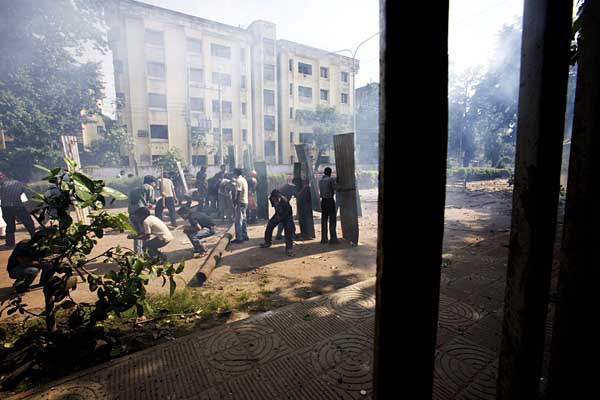
Students at Dhaka University shielding themselves with sheets of tin, during fights with police. Photographer anonymous.
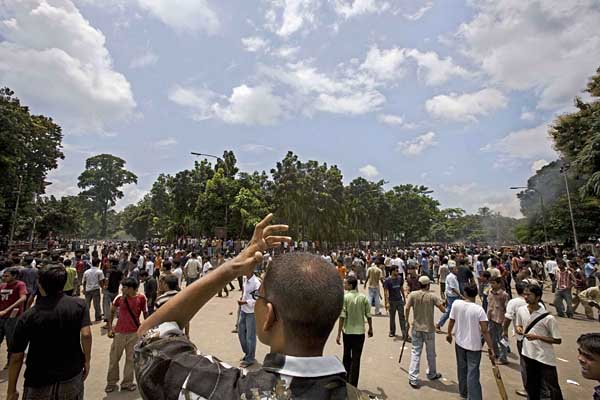
Protesting students gather at Dhaka University campus during violent clashes with police. Photographer anonymous.
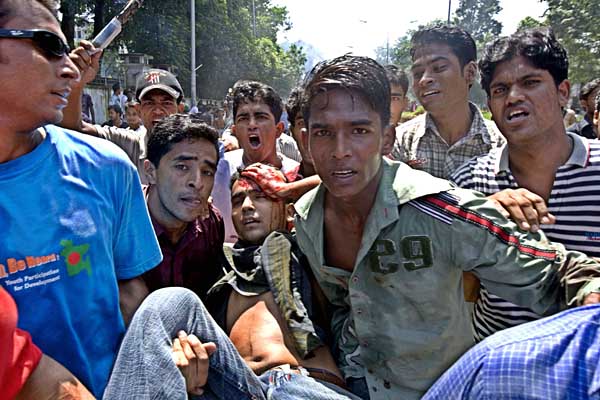
Student hit by police shotgun bullet being carried away by fellow students. Photographer anonymous.
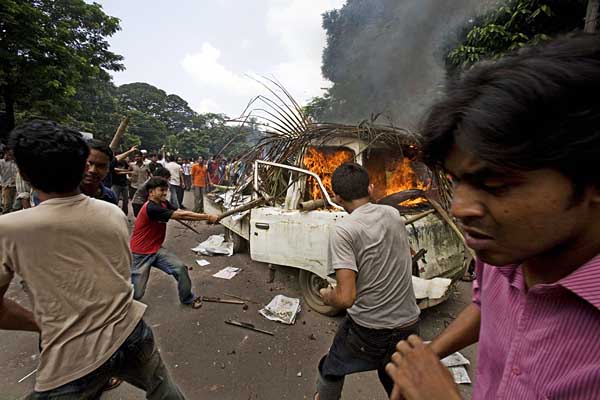
Enraged students burn a car at the Teacher’s Student’s Centre (TSC). Photographer anonymous.
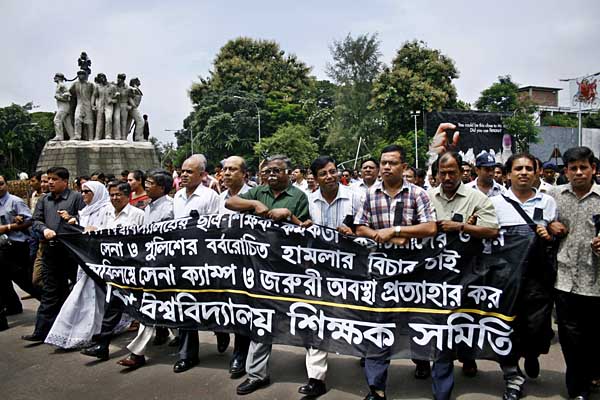
Members of Dhaka University Teacher’s Association protesting against the attacks on campus by police and army, and demanding withdrawal of the state of emergency. Two of the teachers in the front row have since been arrested. 22 August 2007. Dhaka Bangladesh ? Munir uz Zaman/DrikNews
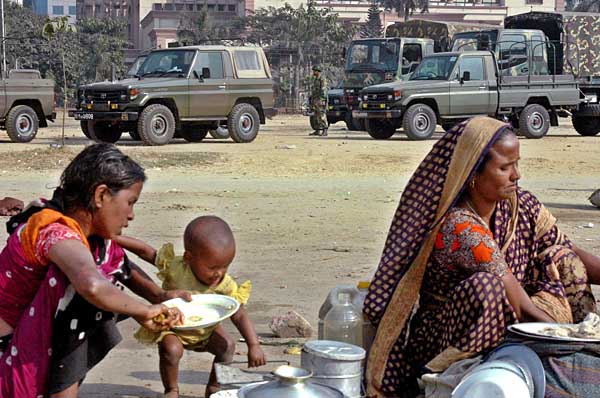
Rocketing prices of essentials create extreme distress for people with low earnings, like the people pictured in the foreground. The military of Bangladesh, which has not had to fight since the birth of the nation in 1971, has in the meanwhile, had increasing budgetary allocations in each successive regime. Numerous allegations about corruption in military purchase, has gone uninvestigated. 22 August 2007. Dhaka Bangladesh ? Munir uz Zaman/DrikNews
The government had taken all mobile networks off the air. With only official press releases for information, the person in the street was in for a rough time. It was easy to find Joshim in the empty car park. Only the occasional long distance truck plied VIP road. I put the video camera on record mode, but relied on my less conspicuous LUMIX to photograph the empty streets. Though I stopped on the Mohakhali flyover to take pictures, I was nervous when the RAB vehicles passed below. There was never a good time for being arrested, but this was as wrong a time as it could get.
Aaasteeey! The policeman strode over lazily. Ki bapar? I did have my card dangling from my neck, and from previous experience, used my confident, ‘I belong here’ approach. That usually worked best with low tier security people.
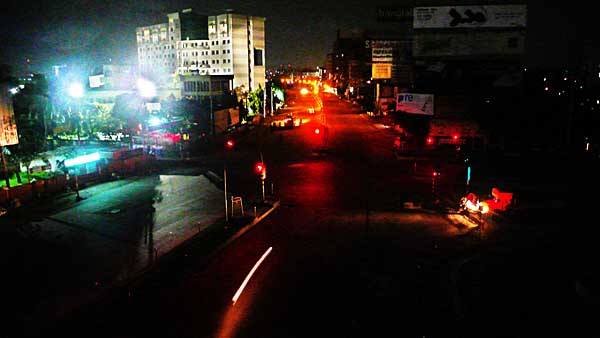
The Mohakhali Junction, one of Dhaka’s busiest traffic spots, is empty on the night of the 22nd August, when the government called an indefinite curfew. Dhaka Bangladesh. ? Shahidul Alam/Drik/MajorityWorld
I’d stopped to take pictures by the near-empty Tejgaon rail station. Stepping carefully through the people sleeping on the floor, I came up to Shahjahan and Neela. Unaware of the curfew, they had brought their sick child Shamim from Tangail, but got stranded in Tejgaon. There was no food, no doctor, no place to sleep, no way of knowing how long this would go on. Each visit to the toilet cost 5 Taka.
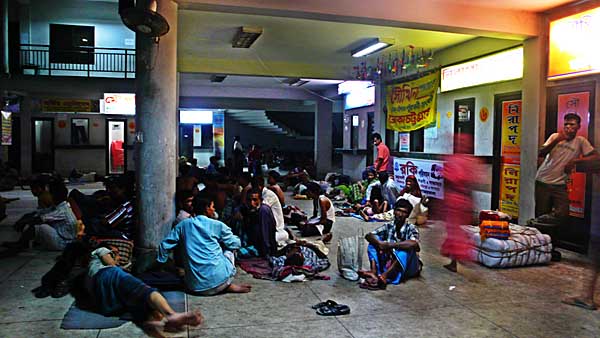
Stranded passengers at Tejgaon Railway Station, sleep on the floor. 22 August 2007. Dhaka Bangladesh. ? Shahidul Alam/Drik/MajorityWorld
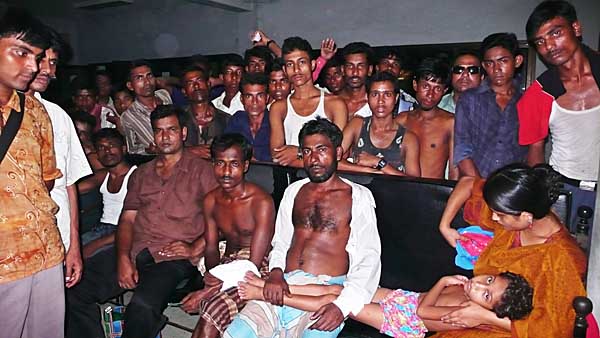
Shahjahan and Neela tend to their sick child Shamim, whom they had brought to Dhaka for treatment. Along with other stranded passengers at Tejgaon Railway Station, the family had no food or drink, or a place to sleep. 22 August 2007. Dhaka Bangladesh. ? Shahidul Alam/Drik/MajorityWorld
The next checkpost was slightly more hostile, but the expired accreditation card dangling from my neck was working overtime. We passed without much harassment. Dropping Joshim home, I went past the Shonar Bangla Market in Karwan Bazaar. The busy market place had a haunted look. No cackle of chickens, haggling for prices, or calls from vendors. Just one man counting loose change.
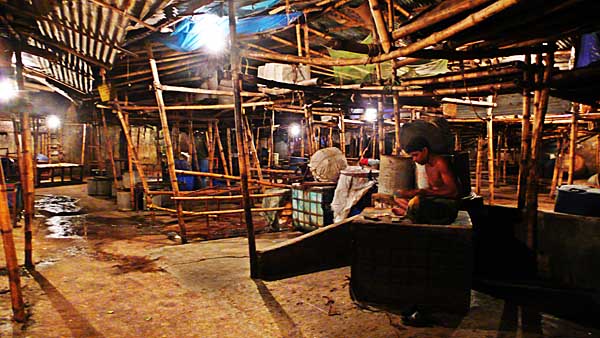
Shonar Bangla Market at Karwan Bazaar is one of the busiest market places in Dhaka. The shops are empty on the night of 22nd August 2007. Dhaka Bangladesh. ? Shahidul Alam/Drik/MajorityWorld
The brightly lit Square Hospital in Panthapath stood out in the dark. Government orders to turn down the lights after dusk to save electricity was presumably for commoners only. The street was empty, but this time as I approached with my camera police converged from all directions. I fumbled a bit, but recovered in time to get one shot. This was not the time to look for best angles. Rattling off important sounding words like ministry of information, and dropping the occasional names I could think of, I got into the car and drove off before the uniformed men had gathered their wits. A government adviser’s business interests in Square Pharmaceuticals – while undeclared – was well known. Students had already attacked the building the previous day. The approaching police knew whose business interests to protect.
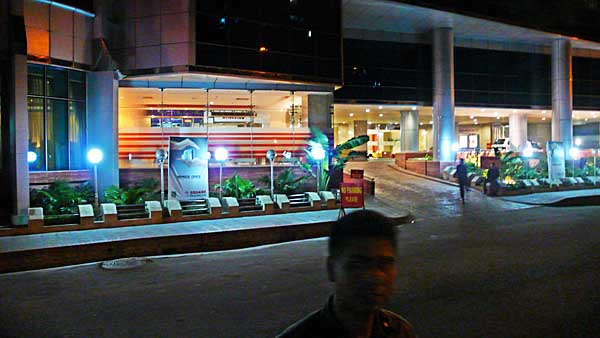
The Square Group, one of the wealthiest business enterprises in Bangladesh owns the Square Hospital. Government regulations prohibit the excess use of electricity and non-essential shops are required to close by 8 pm. Several people were killed by the police when they came out in protest, demanding adequate electricity. The Square Group is owned by the family of one of the advisers of the caretaker government. 22 August 2007. Dhaka Bangladesh. ? Shahidul Alam/Drik/MajorityWorld
The road through Dhanmondi was eerie. The women who walked the streets near Abahani playground were nowhere to be seen. Like the many others who struggled to make a living, they too would not be earning tonight.
The junction near ULAB was scarred by burnt tyres. The convoy of police vans deterred me from getting my camera out and I turned into road 4A. It was time to go home. Kamaler Ma, Joigun, Zohra and Rahnuma were all up waiting. With the mobile network off, they didn’t have any news about me. There must have been others in many more homes who were up worrying.
Rahnuma and I talked of the events over the last two days, of the army camp in Dhaka University. Of a soldier slapping a student. Of the vice chancellor (acting) being beaten up by police. This had never happened before, not even during the Ayub or Ershad military regimes. The reference to ‘evil doers’ in the chief adviser’s speech to the nation was worryingly close to the ‘axis of evil’. Independent media channels were then still defiant. That night the information adviser advised the media to practice ‘self censorship’.
Despite their claims, this government had never been called in by the people. We had no say in who the advisers would be. It was not military rule the people had welcomed, but the cessation of violence and the fear of further anarchy if the rigged elections were held. Banana trees would have made equally good replacements. However, banana trees would not have sold national interests. Closed down environmentally-friendly jute mills. Made slum dwellers homeless, or tortured and killed adibashis protesting the military acquisition of their ancestral lands. So while there was initial relief, as the price of essentials soared, news of nepotism and the partisan manner in which Jamaat -e-Islami was being shielded soon made people realise this banana tree would never bear fruit, let alone run a government.
Warrantless arrests by plainsclothes army under the cover of curfew. Dissenting teachers picked up in the middle of the night. Making threats to independent channels ETV and CSB are hardly the character of a saviour government pledged to the return of democracy. As the behind-the-scene military decides it will now take centre stage. As Bangladeshis realise that a democratically elected autocratic government has simply been replaced by an unelected autocratic one, the tune in the streets is changing.
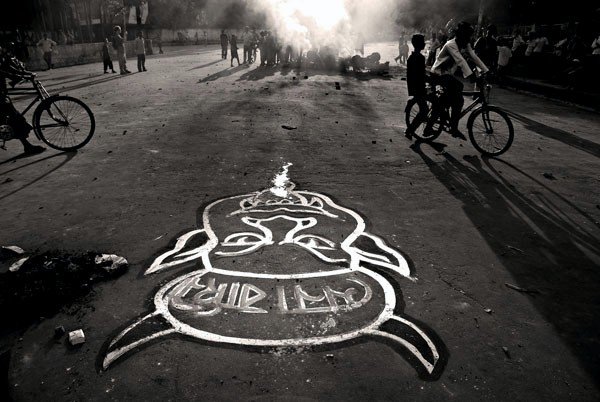
Symbols of fascist oppression drawn on university road. 21st August 2007. Dhaka Bangladesh ? Munem Wasif/DrikNews
Multiple demands of students and teachers have been whittled down to one – withdraw emergency rule. Underground pamphlets are spreading like wildfire. With the Internet down, text messages are filling up the ether. The information adviser’s suave statements to the media faltered as he snapped, “why such a fuss about a slap or two?”
****
The photograph that was being shown here has been removed on the request of the photographer
****
“In unprecedented scenes, soldiers in uniform were seen being chased out of the Dhaka university campus by students. In two days, the myth of the army’s omnipotence was all but laid to rest.” BBC. Photographer Anonymous.
The US has declared support for the chief adviser’s statement. What he lacks is the support of the people.
The Trojan Horse
Standing in the grand parliament building in Karachi, built by his grandfather, veteran Pakistani MP Qamar Zaman reflected on the irony of it all. He had long campaigned against the militarization in Pakistan, but recent developments in Bangladesh worried Zaman. ?They saw what went wrong in the Pakistani experiment and decided to fine tune it? he lamented. The election commissioner in India, SY Quraishi, repeated the sentiment. Bangladesh following in Pakistan?s footsteps was not something he welcomed. Kunda Dixit, in Kathmandu, talked of how the same blueprint was being used in all our countries. Despite the rhetoric of democracy, the militarization of South Asian countries was the flavour of the day. Aided by chaotic situations created by political mismanagement, the anti-corruption Trojan Horse brought in its deadly military content.
As in Troy, the people had welcomed them with open arms. Years of mismanagement and corruption had worn down their patience. People wanted respite, regardless of where it came from. This was just the window the military needed. Not wanting to lose out on the lucrative UN placements, they needed a mask. The ?neutral? caretaker government was the perfect foil. The arrests of corrupt politicians, businesspeople and godfathers provided a much needed relief. Few worried about the flimsy, and sometimes concocted accusations used to reel them in. None dared to speak of the glaring omissions. Curbing media freedom took care of the main obstacle. The military or the Jamaat were strangely absent from the list. Amongst the largest and most controversial deals made during previous regimes were the MIG and the Frigate purchases. Yet neither had featured in the cases being investigated. ?kaker mangsho kak khai na.? (A crow doesn?t eat crow?s meat).
After much foot dragging, and over two months of delay, a one member body was asked to probe into the death of adivasi activist Choles Ritchil in the most gruesome killing while in military custody. The Shadarghat launch disaster, in contrast, had three separate investigation committees ordered to submit reports within 24 hours. Choles on the other hand had resisted a multimillion dollar deal to take over adivasi land. It was a different ball game.
Tasneem Khalil was one voice that they had not been able to silence. His incisive, well researched investigations flew against the culture of silence that prevailed. Mahfuz Anam, the editor of the leading English daily, The Daily Star, had proudly told me, ?In all these years, not a single story had been spiked.? That was some time ago. Things were different now. The story of military involvement that Tasneem had revealed was pulled back from the press in the last minute. A commentator on the roundtable at Drik on the 3rd May, International Press Freedom Day, had equated the Daily Star and the Daily Prothom Alo with a new political party. The newspapers had elaborate reporting on the US ambassador’s love for democracy and a free press. The Drik roundtable, featuring some of the bravest journalists working in the land, went unreported. The roundtable had discussed the military, the corporate deals taking place, the heavy hand of foreign countries. It talked of deals being pushed through in the absence of dissent. Tasneem had deliberately not been asked to speak. That would be inviting trouble.
That didn?t protect Tasneem for long. In my room in Shangri La Hotel in the early hours of this morning I received an SMS from a student. Tasneem had been picked up from his home. This is a risk that all journalists speaking against the?government are prepared to take, but given what Choles Ritchil went through, this arrest is more ominous. A suicide note for an epitaph is too likely an outcome to let the system take its course.
Shahidul Alam
Kathmandu
11th May 2007
From SAJA list:
Daily Star reporter (formerly with New Age), and CNN Dhaka stringer, Tasneem Khalil was
picked up by men in plain clothes @ midnight, claiming to be from
“Joint Forces”/Army.
Tasneem Khalil Picked Up By “Joint Forces”
CNN Reporter Picked Up
Tasneem’s Blog
Tasneem, We’ll Come Get You
http://salamdhaka.blogspot.com/
Human Rights Watch Issues Alert
Tasneem on Choles Ritchil Case
Tasneem on Modhupur
Tasneem quoted in Washington Post
Sabash Bangladesh!
